











Overseas model shown. Australian specifications and features may differ.

Whether you’re just starting out or well into your wealth creation journey, making sound investment choices to grow or protect your wealth, and superannuation, is vitally important.
Today, we face share market speculation, interest rate uncertainty and an increasing cost of living, however one thing history shows is the ASX continues to grow.
There are more than 2,800 companies listed on the ASX (Australian Securities Exchange) and tens of thousands listed globally. Coupled with the number of investment vehicles available, such as stocks, bonds, exchange traded funds and Real Estate Investment Trusts, the number of potential investment options available is practically endless.
This highlights the value of advice, providing you with the insights and research to help you make informed investment decisions, tailored to your financial position and risk tolerance.
With origins dating back to 1872, Ord Minnett is a leading advice and investment firm that has been building wealth for generations.
Our financial advisers, or private wealth advisers as we call them, have the skills to provide advice for every stage of life.
We have a team of qualified experts who you can partner with to create diversified, tailored investment solutions that suit your financial position.
Our in-house research teams dig deep into company data to help you make informed decisions, while our broad business also gives clients access to investment opportunities.
For investment advice or a complimentary review of your financial position, start a conversation with Charles Chirnside today.
Start a conversation
Call Charles Chirnside on (02) 8216 6660 or email cchirnside@ords.com.au
For more information visit ords.com.au

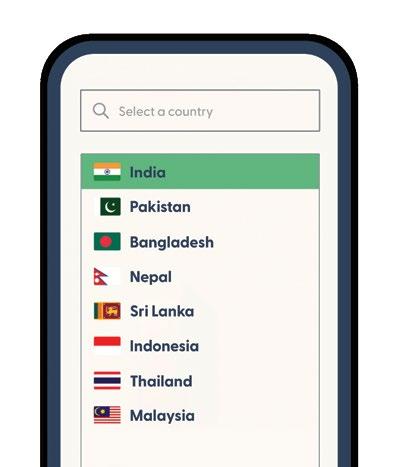
PUBLISHER
Pawan Luthra
EDITOR
Rajni Anand Luthra
CONTRIBUTORS
Torsha Sen, Lakshmi Ganapathy, Tarini Puri, Prutha Chakraborty, Khushee Gupta, Renesh Krishnan, Vinaya Rai, Dhanya Samuel, Sandip Hor, Neeru Saluja, Minal Khona, Auntyji
SALES AND MARKETING
Charu Vij
ADMN
Aanchal Matta
Indian Link is a monthly newspaper published in English. No material, including advertisements designed by Indian Link, may be reproduced in part or in whole without the written consent of the editor. Opinions carried in Indian Link are those of the writers and not necessarily endorsed by Indian Link. All correspondence should be addressed to:
INDIAN LINK MEDIA GROUP
Level 24/44 Market St, Sydney 2000 GPO Box 108, Sydney 2001 Ph: 02 9279-2004
Email: info@indianlink.com.au
 NBY PAWAN LUTHRA
NBY PAWAN LUTHRA
ot with guns but with pens, not with bullets but at the ballot box, with no storming of the Capital, India’s voters showed their true democratic values.
India’s 2024 elections were expected to be a David-Goliath battle, with the Modi-led Bharatiya Janata Party (BJP) as the Goliath expected to trample all over the Congress’ David.
But in what has been called a political earthquake, BJP fell short in its own right to form government, having secured 240 seats in a parliament with 543 seats. BJP was forced into coalition with other parties to get it the additional 30 plus seats. It was a true testament to the democratic traditions of India. We talk about a world of fake news and the effects of deep fakes – yet in this election which had over 650 million votes, it was the good old-fashioned feet-on-the-ground type of politicking and local issues at work.
Narendra Modi has become PM
for the third time. But this time round, he will need a different style of governance.
Modi 3.0 will need to be a more centrist leader, with a more consultative style.
Both could be hard on him as he has been a champion of pro-Hinduism policies. Equally, as Chief Minister of Gujarat and as PM over two previous terms, he has led a majority government in his own right, so being centrist or consultative will be a challenge.
Yet we also need to be mindful that though Brand Modi has been damaged, Modi himself continues to be a hugely popular leader, his party a very disciplined, well organised, cadre-based political party. They have won 240 seats to the 100 seats won by the next largest party, the Congress, so while BJP is wounded, it is by no means out.
The challenges of incumbency were more significant than anticipated.
After a decade in power, Modi and the BJP faced an electorate where many, predictably, were ready for a change and reluctant to support them again.
Then, Modi led a campaign which was built largely on communal and
negative politics. Rather than point out India’s GDP growth achievement of eight percent, the infrastructure build-up in the country, or how well India is perceived internationally, Modi played the race card more often than required. That worked against him.
Finally, issues such as youth unemployment, high prices due to inflation, and local politics and issues also played a significant role these elections.
Moving forward, it’ll hopefully be a time of healing and creating more opportunities for all, especially certain sections of the minority who have been feeling vulnerable in recent years.
The Indian economy is on the upswing, but inequality is rising. Private investment needs to increase and more opportunities for the middle class need to be created.
My major takeaway from the elections is the admiration of how a mature democracy can work, where 660 million people expressed their feelings at the ballot box, and chastised a leader.
A seamless change in style of governance, if not government, achieved through the ballot – that’s a win for democracy.

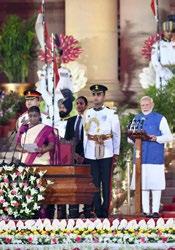
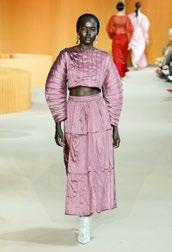
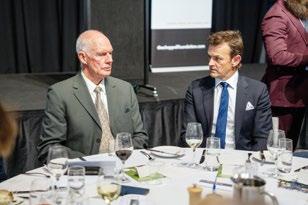

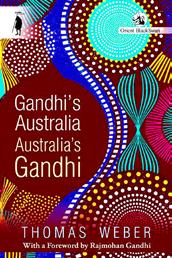









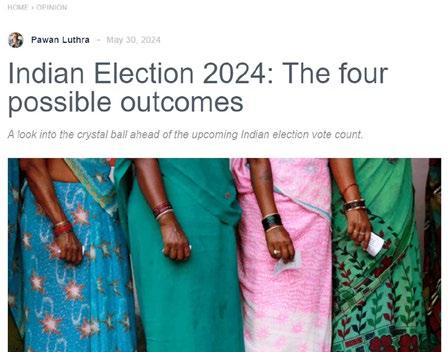
PAWAN LUTHRA discussed the results of India’s 18th General Election on ABC TV and ABC Radio
Mahrukh Mundul wrote: Great respect for the Indian electorate!
Manoj Narsey wrote: Good summation, but did India have a choice for leadership for the mass to vote BJP out of power, I think not. Great result for democracy, a wake-up call nevertheless.
Tharini Rouwette wrote: Best commentary on the Indian elections.
Lakshmi Ganapathy wrote: I found this latest election pleasantly surprising, for the reasons you have explained here - great insights. Always glad to see democracy in action.
Raja G wrote: "Not storming the Capitol." What a novel idea!
Diana Christopher wrote: Fantastic overview of the Indian election.
Tanya Curtin wrote: Thanks for your insight and clear explanations. What an incredible election with so many votes to count! Wow.
Sunny Duggal wrote: The recent display of Indian democracy, where a significant number of voters participated in the electoral process, showcases the strength and vibrancy of democratic values in the country. This event not only reaffirms India's commitment to democratic principles but also has the potential to influence global politics by setting an example of democratic resilience and citizen engagement in governance.
Anne Cherry wrote: Great interview; such an interesting result and an insightful analysis from you as always.
Abhigyan Shrivastava wrote: This analysis seems to focus on surface level aspects of the election results. Have you considered that -
n Only 600,000 votes separated BJP from 272-seat mark
n BJP still alone secured 36.06% vote share i.e. 23.59 Cr. which is up from 22.90 Cr. five years ago n Unemployment, inflation, cost of living etc were not the issues in this election but freebies and a fake narrative of threat on the constitution. Analysts must know that Modi still has an approval rating on over 70% and remains the undisputed leader both in his party and the NDA. Seat loss has also proved that BJP's position is correct on religious appeasement. The voters have asked for the political and ideological continuity and that's why he is again elected for 5 more years.
Vinesh V George wrote: Very good overview and summation. The depth and breadth of this talk makes me know I need to be looking into Indian Link as a good source of editorial content. I feel the extent of trade partnership proposals and initiatives in play already set in motion will continue, though new initiatives may indeed have lower attention.
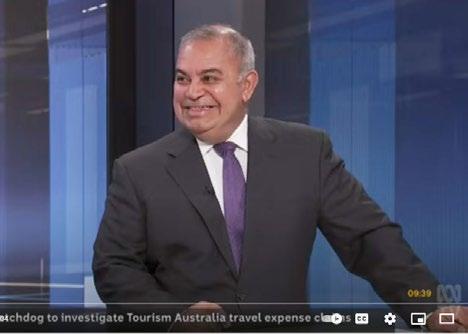
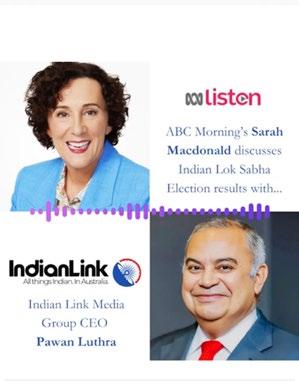
Shyamala DVS Rao wrote: The quoted message gives an excellent summary of the lopsided antiModi perspective. The Opposition joined forces with every political party that was against BJP and Modiji. On the other hand, the BJP contested independently and with fewer alliances in many places. The vote share of the BJP went to double digits for the first time in Tamil Nadu in 6 decades which is still dominated by Dravidian parties.
What Western media overshadows is that the BJP with fewer alliances won this election. BJP alone won 240 seats which is higher than the 232, the total number of seats of INDI Alliance won with 26 parties.
The view presented in the discussion appears to be lop-sided and West influenced. Also, it sounds like representing the personal displeasure of Western media against Modiji's government rather than that of the national view of Bharat. A majority of the people of India are more pleased to vote for BJP than any other party in India in the 2024 election. People with pens should use them accurately and honestly to spread the truth.
This may be a diplomatic move of the BJP and a leader like Modiji to let other political parties and themselves know their capacity and their individual vote bank so they can negotiate better and retain their seats in the next election. Only confident leaders can take such calculated risks.
Another beautiful thing that can be observed is that one can see how democracy is preserved despite the leadership of Modiji who was in power for 10 years. His leadership is taking India to a great height. A well-deserved victory for Narendra Modiji. Kudos to
his government's pledge to maintain democracy. One cannot expect such a democracy in a country like Australia which does not have a Human Rights Act and inclusive national anti-discriminatory policies. As Australians, we have a long way to go to understand democracy. We are the country that said NO to the Yes referendum for its First Nations communitieshappily denying them equity and voice.
Swami Nathan wrote: I don't think it is a good idea to mention Donald Trump (with all the legal wrangles he is going through at the moment) in the context of Indian elections. Modi and his team hopefully are trying to do what is good for Bharath irrespective of who the leader is in USA, UK or Australia. The youth unemployment problem - I don't think a government in any part of the world (whichever party rules) alone can do anything about it. The youth need to wake up and follow the teachings of great people like Swami Vivekananda. They (not all) are still chasing "paper qualifications". Those who have ventured out with innovative ideas and hard work have succeeded in many states of Bharath irrespective of which party is ruling. e.g; Praggnanandhaa (Tamil Nadu) make Bharath feel proud of him. Sridhar Vembu is another great example from Tamil Nadu. I find the drone industry growing fast in India with many innovative companies taking the lead.
Keeping the religious sentiments aside people of Bharath should focus on progress and security of the country. Unfortunately, people of Bharath feel more united only when the security of country is under threat. They seem to have forgotten what it is like to be under a "foreign rule".
Eugene Reinboth wrote: Pawan Luthra, looks like your Option 3 has panned out. Should be sobering for the BJP. Encouraging for all those supporting secularism and a non-autocratic style of government. Am pleased that the electorate has done their job in participating in how the country is run. I had expressed my reservations about that. The future of Modi and Shah?
Martin Bede wrote: Some great insights on the Indian election.
Tracey Holmes wrote: Very informative. Interesting days and months ahead.
Shriram Iyer wrote: Articulate, engaging and clear. Ron Barooah wrote: Huge lift for democracy everywhere.
Jai Patel wrote: Great synopsis.
Morry Morgan wrote: Fascinating and fantastic overview.
Jeanne BT wrote: Sarah MacDonald, I really enjoyed your interview yesterday with the Indian reporter. I missed his name but he spoke really well about the Indian election results. Would love to follow him.
Simon Disney wrote: Excellent insights from Indian Link's Pawan Luthra on the Indian election. Recommended viewing.
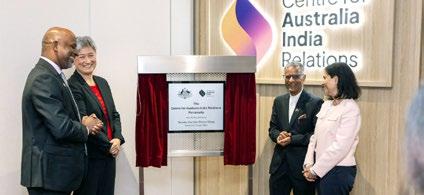
PAWAN LUTHRA on the launch of the new headquarters of the Centre for Australia India Relations.
Sriraman Annaswamy wrote: Was a memorable launch, excellent audience and well-organised event. Good show Tim Thomas and Team CAIR. Pawan Luthra wrote: The challenge for CAIR and its leadership of Swati Dave and Tim Thomas, among others, will be to expand the range of bilateral trade opportunities between India and Australia. Coal briquettes still dominate Australian exports to India. The speed with which other high value exports start figuring in our trade relationship, is crucial. ECTA has been a positive start; by all accounts, CECA is a while away. With the millions invested by the Australian government, expectations from CAIR are high. The reality is that India’s imports from Australia fell 19% on an annualised basis during April-November 2023, mainly due to a fall in the demand for coal, coke and briquettes in India. This just follows an overall global decline for coal briquettes by India of 33% in the same period. As India moves towards alternative forms of energy (albeit slowly), Australia needs to find other lines of trade- and fast.
Dipen Rughani wrote: Well captured. Agree on the need to spread trade lines and minimise the reliance on coal. However, it is important to remember that India acquires 70-80% of its coking coal needs from Australia, which is used for steel production, which in turn is used for India’s huge need (trillions of dollars) for infrastructure development. The 19% decline you mention is predominantly due to the drop in coking coal prices from an all-time high of USD530 + per ton back to more realistic prices today. The Trade Minister Don Farrell, on the launch night, mentioned some large increases in other trade such as agriculture; however, these are from a low base. The positive is that they are on the up and with the imminent signing of the CECA (possibly end of this year), I can only see a better more diverse trade relationship between Australia and India in the future.
Jasmine Batra wrote: Aside from bilateral trade as a measure, the Centre’s role in innovation and exchange of emerging technologies would drive economic benefit for both countries.
Mala Mehta wrote: This is a fantastic initiative and well covered in your article.
VAANIE KRISHNAN was in the Sydney Comedy Festival audience as Australia’s best (and first) South Asian women’s group stood up and took the mic.
Brown Women Comedy wrote: Yassss!!!
Daizy Maan wrote: Thank you. So honoured that you’ve chosen this story for the cover. What a pleasant and heartwarming surprise.
Lee Alex.Diba wrote: So happy to see this! Runiversal.studios wrote: We made the cover of Indian Link magazine! Thank you to Vaanie Krishnan for the amazing write up. I ugly cried when I read this article.
At 34-metres tall, 45-metre long and 25-metres wide, this steel bust of Shiva is recognised by the Guinness World Records as the "Largest Bust Sculpture” in the world.
Where in India?
Readers Taufeeq Ahmed Sheikh, Jyoti Dogra, Gurasis Singh, Bhanu Kothari, Poviponkumar Sethuraman and Meena Sunder got the right answer: Adiyogi Lord Shiva statue, Isha Foundation, Coimbatore, Tamil Nadu.
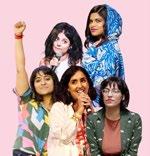
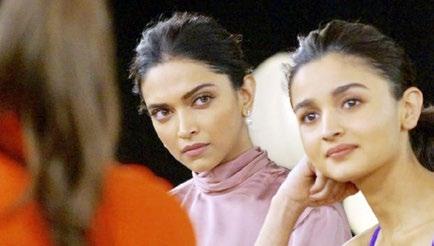
We asked, what’s Deepika Padukone thinking here?
Tanima Banerjee wins a free movie ticket for her response: Mana tumhari beti cute hai but meri bhi on the way hai.
Rashida Alihusein wrote: I hope I look interested enough. Honestly I'd rather be having a telmalish!
Kunal Pandit wrote: If Ranveer is wearing this today, what am I supposed to wear for tomorrow’s event? But somehow he is carrying these colours better than me!
Ramesh Chand wrote: How can Ramesh get another ticket to take me on a date at the movies?
Nester Alexander wrote: How dare you say I'm having a surrogate pregnancy.
Ulhas Bhovar wrote: Hey bhagwan, why is she a more brilliant actress than me?
Ambarish Natu wrote: Could she be having an affair with Ranveer?
Leena Vohra wrote: Why is Alia ignoring me?
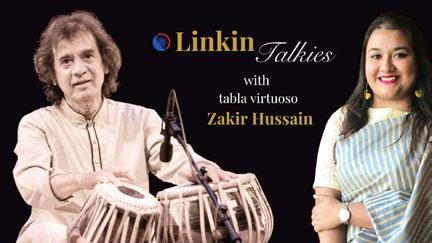
Ahead of his Australia tour, the tabla legend spoke with TORSHA SEN about his favourite GRAMMYs moment, his cameo in Dev Patel's Monkey Man, about India being as unified a statement as a symphony orchestra, and much more!
Himika Chaudhuri wrote: Fabuloussss!
Vaishali Goel wrote: I can’t wait to see him at the Sydney Opera House in July. Torsha has made it all the more special.
Anshula Sarkar wrote: Excellent! Loved the interview.
Rashi Wahi wrote: Great work, keep it up.
Rajni Luthra wrote: Nice questions, Torsha, for a fabulous interviewee!
Abhi Mukherjee wrote: An excellent performance.
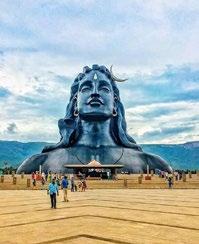
Devavrata Bhattacharya wrote: I met him when he was just 21 years old, at Amravati in Maharashtra. Handsome in looksand fantastic with thetabla.
Snehlata Sharma wrote: A nice interview Tosha, well done. Proud of you.
Where in Australia is this region of white beaches, clear water and orange granite that was famously named in 1773 by Captain Tobias Furneaux who saw the fires of the Aboriginal people on the beaches?
Readers Frankie Gerard, Chitra Iyer and Sweta Shah got the right answer: Bay of Fires, Tasmania.

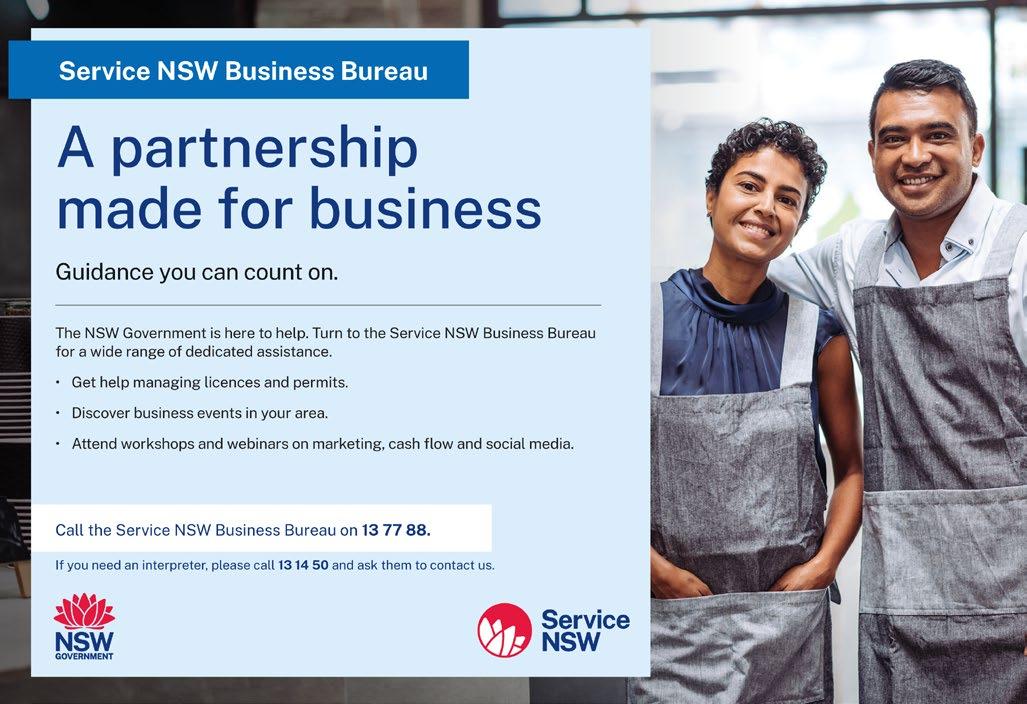

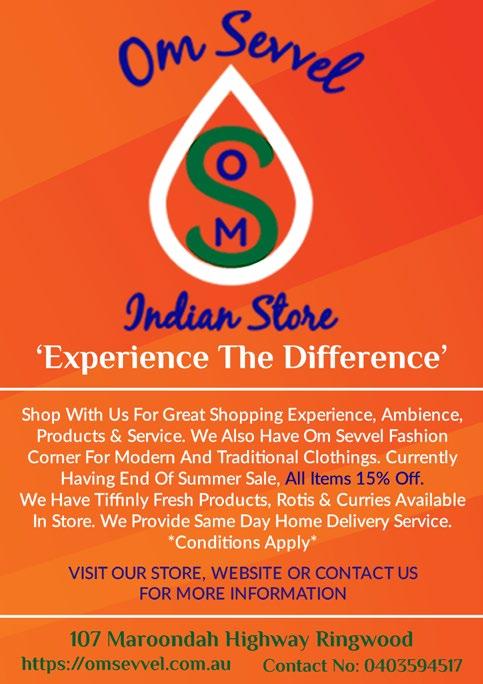

The unexpected results of this election are something that ought to give Indians from across the political spectrum (and indeed the wider democratic world) cause for celebration. Prime Minister Narendra Modi swept to power in 2014 and whilst many celebrated his unprecedented electoral success, it also saw a virtually non-existent opposition at the federal level for the past decade. Whether one supports PM Modi or not, it must be conceded that a strong opposition provides strength to the foundation of India’s proud democratic tradition. Indeed, in an election where there has been troubling rhetoric against minorities, brazen support of political candidates by mainstream media (an issue also prevalent in Western democracies including Australia) and controversies around the arrest of opponents and freezing of opposition finances, this election had many feeling concerned about the future of India’s democracy. Wherever one stands, I firmly believe that checks and balances on power are vital for the success of any democracy. Ultimately, this election has provided PM Modi with a historic third term whilst also ensuring an institutional check on that power. That is an outcome that I feel all Indians of all political persuasions can celebrate; a celebration of the world’s largest democracy.
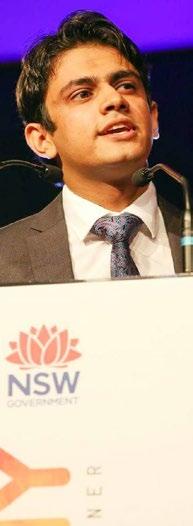
President, Overseas Friends of BJP; Director, Indian Australian Diaspora Foundation
In the 2024 General Elections, Prime Minister Narendra Modi has again secured a decisive mandate, although short of expectations. He is poised to serve his third consecutive term and will be India's longest-serving head of government (state /centre). This achievement, rare in large democracies, reflects public trust in Modi's development and reform initiatives. Overcoming unique challenges like modern day media scrutiny of hundreds of news channels, digital media and anti-incumbency, Modi is only the second Indian PM to win three terms. This victory contrasts sharply with the previous government whose corruption scandals that decimated Congress's seat count to just 44.
Despite falling slightly short of expectations, PM Modi remains immensely popular, with the BJP the sole party capable of ensuring stable government. The BJP's lowest tally in three terms surpasses Congress's combined seats over the same period. Unlike INDI Alliance, the NDA partners share a unified vision for reform and development, minimizing internal competition.
This outcome also underscores the Western media's ignorance of Indian
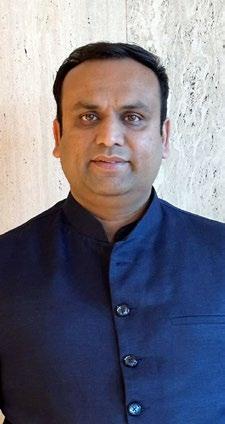
democracy as they continually cast baseless doubts, prompting questions about a potential apology to India's 1.4 billion citizens.
Founder and head, Newland Global Group, a corporate advisory firm
Amarathon seven-week election with over 640 million people voting, setting a world record.
The Indian election results were surprising to say the least, defying huge exit poll predictions. It was fascinating to note that the winning NDA coalition was dissected and scrutinised, whilst the losing INDI Alliance celebrated. An interesting paradox, on how ten years of BJP-led NDA rule had crushed the Opposition’s hope of any comeback, and any improvement on the past results by the losing alliance seems like a major win.
Regardless of the result, I believe the India story will remain bullish, because of its strong macroeconomic fundamentals that would support long-term growth. We might see a greater shift towards a welfare-oriented approach with the NDA coalition partners, new political compulsions and power equations.
This election highlighted the resurgence of regional parties, the importance of localised issues, economic issues such as job creation and inflation.
New Parliament dynamics will see the revival of the Opposition and the coalition power-play. The new government’s skills

in negotiation, power sharing, consultative and calculated approaches will dictate policy stability and certainty.
I believe Australia-India bilateral relations are now enduring and resilient to electoral changes and am hopeful of the promise of signing a full-fledged bilateral trade agreement the Comprehensive Economic Cooperation Agreement (CECA) by the end of the year.
What’s at play is how the BJP-led NDA coalition delivers on managing economic reforms and builds good governance and effective leadership through embedded grassroots social engineering.
A starting point will be, reflecting on what went wrong.
The view from Australia: one of reflection, giving way to a more
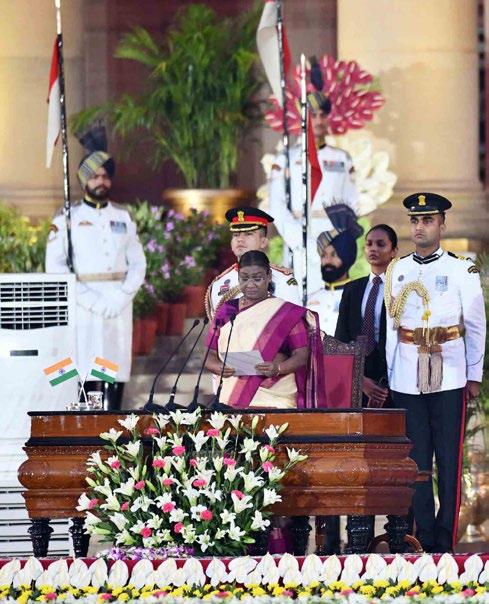
Everyone gets their comeuppance in life. Even people who think they are non-biological or the chosen ones.
The election has galvanized me from a state of funk and utter despair at the naked hate, bigotry and communalism on display, to a more optimistic person with greater faith in India's masses to ultimately get it right.
The toxic polarisation of Indian society can now be addressed, if not redressed.
The Prime Minister might even deign fit to answer questions in Parliament - something that was beneath his dignity for a decade.
Not holding my breath for his first ever press conference, though!
Now, India can truly resume its development as an inclusive society with a lot more checks and balances, REAL rule of the law, an end of bulldozer and raid raj etc.
There I go dreaming again...
A final thought - the chances of this NDA Coalition surviving a full term are two: none and Buckley's.
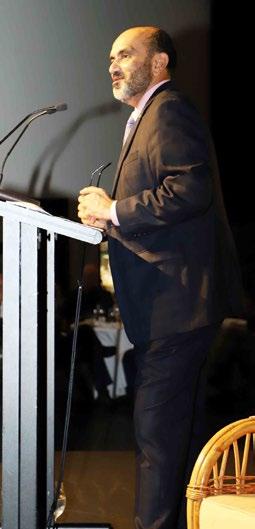
Australia: Across both sides of the divide, the mood is reflection, with the heightened passions of previous months more contemplative and measured discourse
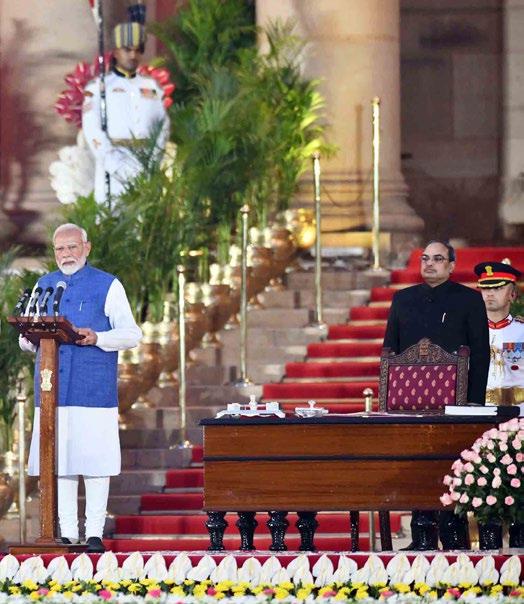
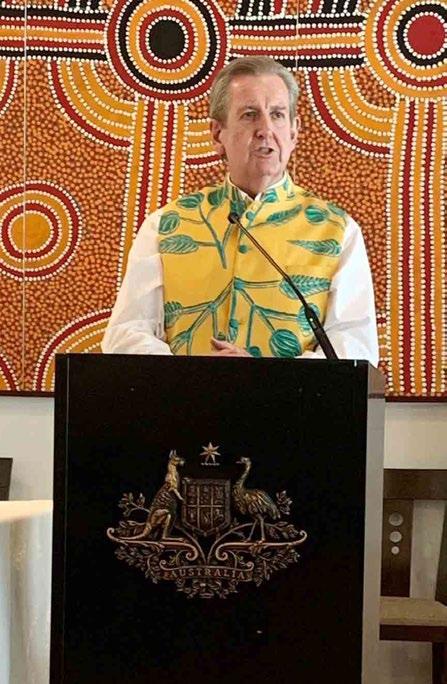
In June last year, my final official call as High Commissioner to India was to meet with the President of the Indian National Congress, Shri Mapanna Mallikarjun Kharge, notwithstanding expectations of a return of the Modi BJP Government.
I was seeking reassurance that the trajectory of the Australia-India relationship would continue if a Congress-led government eventuated. I left the meeting satisfied on that point, if not convinced about the I.N.D.I.A grouping’s electoral prospects.
One of the few advantages of having spent the majority of my NSW parliamentary career in Opposition was the ample time I had to think deeply about voters and elections.
For the last few months, when asked
Wabout the likely outcome by friends, business leaders and others, while pointing to confidence of published polls, I always left open the possibility of an upset.
This was based on the habit of democratic systems to produce surprising results. While the genius of our shared electoral systems is that it’s voters who decide outcomes, they also have the habit of proving polls wrong, as demonstrated by Trump’s victory in 2016 and ScoMo’s in 2019.
This year’s result is cause for optimism and hope. It again demonstrated India’s commitment to democracy and it offers the hope for the emergence of a strong Opposition. And that, as I learned as an MP, always delivers better government.
hat a cracker of an election in India. All that money. All that help from institutions meant to stay independent. All that toadying by media barons. All that xenophobia and targeting of communities. All that comes down to this: Democracy.
Sure, it’s not perfect. But it's a darn sight better than the other options.
For service to community health
Mental health and lived experience advocate Niharika Hiremath has been recognised with an Order of Australia Medal (OAM) in this year’s King’s Birthday Honours.
Hiremath is currently a National Board Youth Advisor and Chair of the Multicultural Strategy Advisory Group for headspace, the country’s leading youth mental health foundation, and is Co-Founder and Managing Director of the Australian Institute for Diversity in Mental Health.
“I'm really humbled and honoured and very thankful to be a part of the communities that I'm a part of, which I think really have played a big role in getting me to this point,” she tells Indian Link Hailing from Karnataka, Hiremath spent her childhood around her grand uncle’s medical clinic, discovering here a desire to help people.
This initially manifested as a Commerce and Biomedicine degree at Monash University, but early experiences volunteering for the Foundation for Young Australians (FYA) and Dandenong headspace influenced her change of course into advocacy, leading her to study a Graduate Diploma of Psychology, and later, a Master of Social Work at the University of Melbourne.
“I was wanting to become a doctor, a psychiatrist specifically, but in terms of having access to spaces myself, [I really saw] a lack of supports that are culturally responsive and can actually speak to the history and the background that I bring. I
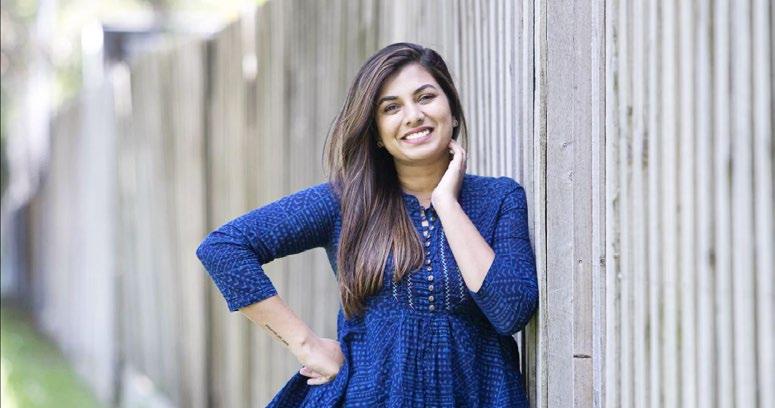
quickly realis[ed] that's a pretty standard experience across a range of different communities as well,” she reflects.
Equally, it was Hiremath’s own diagnosis and journey navigating the mental health system which exposed her to its systematic gaps and the need for diverse voices.
“A glaring [gap] for me is the lack of representation of POCs and those with intersectional identities. Communities really deserve agency and selfdetermination over structures that work for them. It's inherently hard to achieve that, when you hardly ever see people that look like you or think like you when you walk through the door of many of these services,” she explains.
As a migrant majority country, a culturally responsive healthcare system is crucial to work towards.
“People are identifying that this isn't really niche work anymore; cultural responsiveness [isn’t] just a nice-to-have anymore, but really forming an integral part of ensuring that the systems that we have in place are actually fit for purpose for the majority of folks in this country, and doing what they're supposed to be doing,” Hiremath explains.
As such, Niharika Hiremath’s work focuses on how intersectionality and lived experience can be leveraged to address these gaps and create a safer and more culturally responsive system. Her appointment to the National Mental Health Commission catalysed this aim, driving investment in mental health and preventative health as part of the Government’s 2019 Long Term National Health Plan.
“Engaging the lived experience of multicultural communities in advocating for change within the sector is a gold mine which we’re not really tapping into. Again and again, service systems and structures keep coming up against the same barriers; you’re putting lots of money into the same ways of engaging. A lot of those barriers could have been addressed by building stronger support structures for intersectional communities to utilise their own lived experience and not just as a tickand-flick exercise,” she says.
Her current role as a Lived Experience Partner at Mind Australia sees her utilise her own cultural perspective and experience of adversity to inform a deeper understanding of how the mental health
For service to the community through social welfare organisations
For entrepreneur Sakshi Thakur, eliminating poverty all comes back to empowering women. “I truly believe women are going to be the reason we might break the poverty
cycle going forward, because they're the ones that invest their income back into their children's education, back into their families, back into their communities,” she says. “That's why we focus on women.”
Thakur is the founder of ‘Sewing the Seeds’, a social enterprise based in Pondicherry providing textiles education to women, with the aim of removing the social and economic barriers to safe employment. Currently, they employ eight women full-time, with plans to expand to other cities.
“I've been able to see it first-hand,” Sakshi tells Indian Link. “I've seen the children go to school. I've seen the women
invest in their own self-care by how they show up to work, the way they dress up, the way they prioritise themselves, the way they talk about themselves.”
As a descendant of Sindh refugees and migrating between Kuwait, Oman, Sydney and Melbourne, Thakur feels strongly about standing on the shoulders of her female ancestors.
“I truly believe that talent is equally distributed, but opportunity is not. I won the birth lottery by being born into a social and economic status that allowed my family to migrate… I want to make sure I use all the privileges I've had to give back to the generations of women that have
system could operate.
“I think what's great about [Lived Experience] emerging as a discipline is that there's now support structures in place to let people engage in a safe way and ensure that what they're saying will be heard. They're being compensated for their time and their energy, and the process by which they're providing that input is also done in a way that doesn't endanger them,” Hiremath says.
Having found the strength to lead from her own experiences and adversities, Niharika Hiremath encourages other budding South Asian advocates to trust their gut and not fear standing up for what they believe in.
“I think my journey involved moving away from community norms and family norms and advocating for [mental health] when it wasn't openly talked about.
Being able to see the shift in both my personal relationships, but also within this community more broadly taught me to trust my own gut in the process, [and see] advocating as something that is okay to do if there's something that you strongly believe in,” Hiremath says.
Lakshmi Ganapathy
sacrificed so much for me to be here,” she says.
“The women before me were incredible and I really want to make sure that all women have opportunities to have safe employment.Employment is such a powerful way to express yourself.”
Another motivator for Sakshi Thakur is her passion for her cultural roots. From a young age, she’s trained in Kathak with Tatkaar Kathak Dance Institute Australia, sat on the board of IndianCare from 2021 to 2023, and currently teaches entrepreneurship to refugees and migrants through Catalysr.
“I think it’s just in our nature to do, like brushing your teeth,” she says.“You just do it because it's important to do as part of life. It wasn’t something that I saw as an extra curricular activity so wherever I
For service to the community through social welfare organisations
E“very day, I feel like I was chosen to do this work,”
says Harinder Kaur of Glenwood, NSW, reacting to the news of being bestowed with the Medal of the Order of Australia (OAM) for her social welfare activities.
Founder and CEO of the Harman Foundation, Kaur has been an active and visible member of the Indian diaspora in the state over the past three decades. Since 2013, she has worked tirelessly to help vulnerable members of the community –from supporting and sheltering victims of domestic violence to educating the perpetrators, from distributing food hampers for those in need to conducting seminars for spreading awareness about physical and mental health.
As an education officer in the state’s Department of Communities and Justice (DCJ), Harinder Kaur had always been in direct contact with issues like domestic abuse, misuse of alcohol and drugs, relationship and children’s issues etc. Yet it was the tragic death of her eldest son Harmanpreet Singh in a car accident in 2012 that led her to find community service as her true spiritual calling.
A year after her son’s death, Harinder started the Harman Foundation along with her husband Maninder Singh as a means of coping with her grief. She realised quickly that there were many in the community who were suffering just like her. Combining her expertise of the subject, Harinder and her husband started extending their support to multicultural
could add value or wherever I felt like I had skills or time or energy for a particular project that was happening, I would just do it and serve. That's important in our family upbringing, in our values and how we show up for our people.”
Thakur initially started off in the corporate world, working in Financial Services at Ernst & Young (EY), but soon realised her heart wasn’t in it, and took the leap to change careers.
“At the time, it was scary, but I know that in hindsight it was the right thing to do. I know I made my parents really proud by getting that job; every parent just wants to see their child have stability and happiness. Leaving meant there were some difficult conversations to be had, but I was really lucky my parents supported me,” she says. Her time at EY was certainly not
groups, particularly those from the SouthAsian community who were falling through the gaps in state-funded support because of barriers of language, eligibility or access and even cultural differences which made problems more complex.
Cognizant of the recent wave of domestic violence cases making it a national agenda, Kaur points out that issues coming out of the SouthAsian community are more complex. “There are cultural barriers, social-stigma issues, traditions of dowry, conditioning of tolerance etc, combined with a lack of knowledge about rights and responsibilities,” she says, explaining that a large part of the Foundation’s role is to educate all concerned parties and as much as possible, prevent rather than cure the issue.
Harinder Kaur is also advocating for making information readily available for multicultural groups and those coming to Australia on temporary visas. “I feel making the information about roles, rights and responsibilities accessible can help to mitigate many issues,” she says. “We always try for keeping the families together. It’s painful to see children suffer because of domestic issues. It can become a vicious circle and we must always try to break the cycle of substance abuse etc. We work with the perpetrators too and we encourage them to seek help.”
She adds, “Healing can be complex, and we try to educate and guide. However, in cases of last resort where victims - who are largely women - need to be evacuated for safety, we do have the Her House facility where we are able to provide temporary shelter. There is also a 24-hour helpline for those seeking support.”
Over the years, Kaur estimates Harman Foundation’s services have helped more than 500 families with domestic and family violence issues, provided shelter in Her House to more than 75 individuals seeking temporary respite, and distributed more than 20,000 food hampers to those in need.
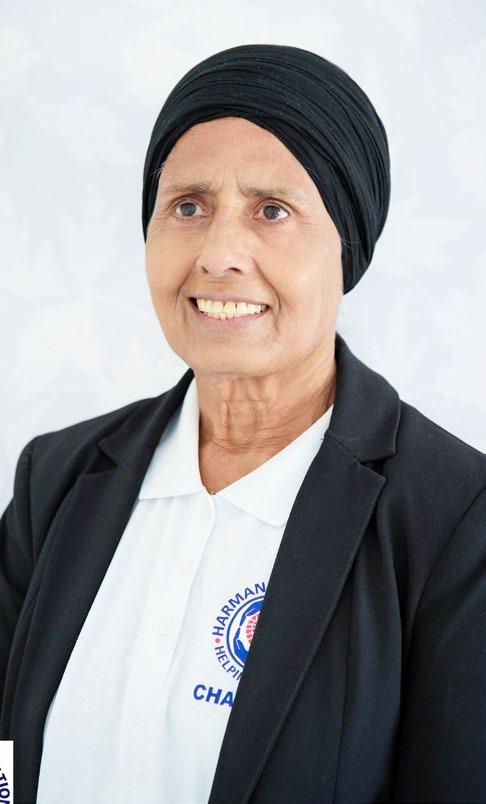
Harinder Kaur takes pride in the efforts of the 200-odd volunteers working with the Harman Foundation over the years which she estimates equates to adding more than $8.3 million to the Australian economy.
“It is the responsibility of everyone to build a more compassionate world,” she notes. “It should be everyone’s business to help others. It’s a duty I surrendered to, and it is what keeps me going.”
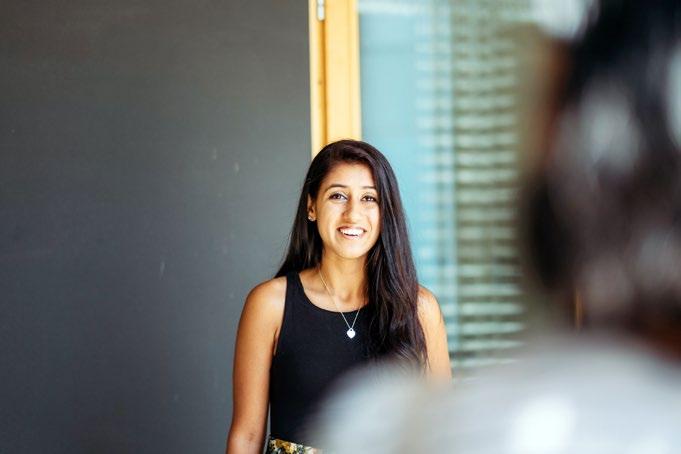
recipient of many awards over the years, Blacktown City Council (2021), Riverstone
“It taught me a lot about the way women spoke about money, especially in South Asian communities, and the way women spoke about business. EY really shaped me; they still have a really big impact on
sector will one day grow to be as valued as
people's time towards the social enterprise sector and the only way we can get that is if we value them equally. I hope the future of the social enterprise sector is it being taken as seriously as the corporate world, because [we] do a lot of good work and really require
Woman of the
The King’s Birthday Honour, however, is truly special.
“This has come as a surprise; it’s a very big honour and privilege. It feels wonderful to be recognised and acknowledged,” Harinder Kaur says expressing hope that the award will help bring their work more recognition and funding too to keep it going.
Tarini Puri
numerous City of Monash leadership awards, a Seven News Young Achiever Awards semi-finalist, and a recipient of the NFP Directors Scholarship from the Australian Institute of Company Directors Governance Foundations.
This month, as part of the 2024 King’s Birthday honours, she’s added Order of Australia Medal to that list.
“Recognitions are nice to validate that you're not doing something wrong and you're on the right track. But I feel like the same person I was before the OAM, and I feel like I'll be the same person after the OAM, which is kind of nice,” she says.
“Ultimately, I just want to make India proud, and I want to make being an Indian woman mean something. I hope I've done that through the OAM.”
Lakshmi Ganapathy

Anushka Singh has never let her vision impairment stop her from living life to the fullest.
Anushka shared her experiences in a Hindi interview with Speak My Language (Disability), a program run by the Ethnic Communities’ Council of NSW to share stories about living well with a disability.
Anushka says she does not feel any shame when disclosing that she has a disability, stating “I always wear my low vision as a crown. It is a part of me.”
Anushka’s story reinforces the importance of self-advocacy and confidence, as she never hesitated to ask for help when she needed it.
“My personal approach has always been to hold a meeting before the course starts,” she explains. “You disclose that you have vision loss. You will need screen-reader software, you can organise a laptop where you can listen to presentations.”
Asking for these adjustments at university was the key to Anushka’s success.
“I was given note takers. I was given
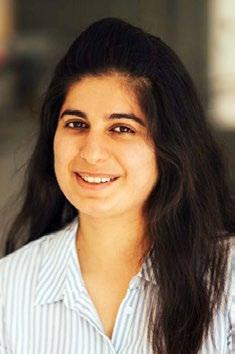
question papers in large print format, and I was given extra time to complete my exams.”

Now graduated, Anushka is a proud Blind Sports Ambassador and works in the national call centre at Vision Australia, helping others with low or no vision navigate the same challenges she has faced over the years.
Anushka ends her interview with a powerful message to others with disabilities, saying, “you should be confident, accept your problems, you should not be afraid to disclose your disability—that is most important—and whatever services are available to you, use them.”
Speak My Language (Disability) is funded by the Commonwealth Department of Social Services. The program is being led by the
Ethnic Communities Council of New South Wales and is proudly delivered via an historic partnership between all State and Territory Ethnic and Multicultural Communities' Councils across Australia.
There are more than 45 Hindi interviews that share information and advice about living with a disability.
Stories like Anushka’s have helped shift attitudes towards disability, and connect listeners with services and resources that support their participation in all aspects of life.
You can listen to Anushka’s full story for free online at www.speakmylanguage.com.au.

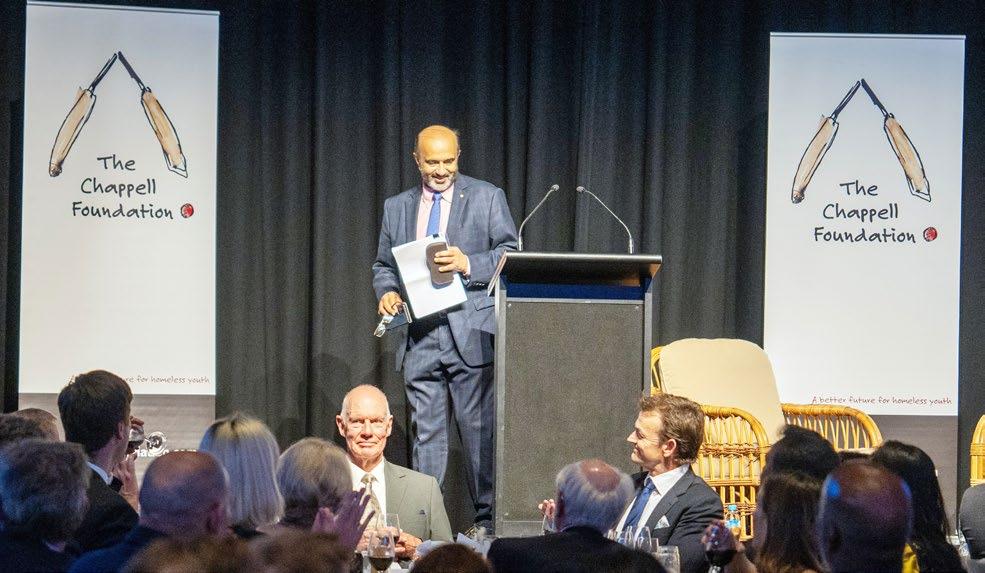
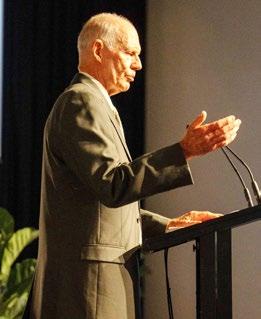
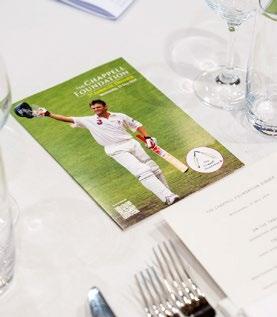
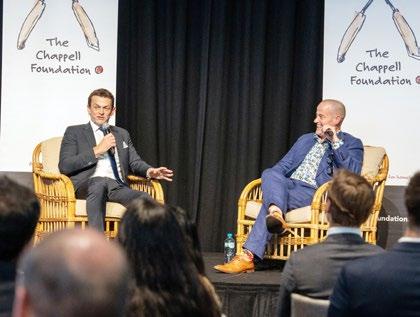
The Chappell Foundation raised over $400,000 this year in aid of the young homeless
 WBY RAJNI ANAND LUTHRA
WBY RAJNI ANAND LUTHRA
hen Sydney-based entrepreneur Darshak Mehta heard about the plight of a local 15-year-old girl who was refused shelter at a safe house for homeless children, he knew what he had to do.
He took it to his board at the Chappell Foundation, of which he is co-founder and Chair. Together they raised funds for the Taldumande Youth Services (which was at capacity the night the teenaged girl knocked on its doors), to buy a larger property.
“I told my board, if people like Taldumande
come to us for money, you and I are not going to be responsible for turning away a 15-yearold, betrothed by her family to a 40-year-old stranger,” Mehta told Indian Link
When he founded the Chappell Foundation with Greg Chappell in 2017, they concurred, “If we can change even one life as a consequence of this, it would be absolutely amazing.”
Seven years later, Mehta noted, “I’m underplaying this, but we have now changed hundreds of lives.”
At its annual fundraising dinner held last month, the Chappell Foundation raised more than $400,000 in aid of seven charities that care for homeless young people, Taldumande being one of them.
Following tradition, the high-profile dinner was held at the Sydney Cricket Ground’s
Noble Dining Room. As usual, drinks were served on the hallowed turf, as the sun went down on a spectacular evening.
Some 465 guests came together to find a way to donate, and to listen to cricket legend and special guest Adam Gilchrist chat with broadcaster and writer Adam Spencer on stage.
In attendance were the Who’s Who of the cricket world (including no less than four Australian captains: Adam Gilchrist, Alex Blackwell, Rachel Haynes, and Greg Chappell of course), CA dignitaries, a whole host of other sporting legends such as paralympian Louise Savage, swimmer Daniel Kowalski and former Prime Minister John Howard as well as Olympic royalty, IOC Vice-President John Coates.
Mehta used his chairman’s speech to send the message out loud and clear about the
Foundation’s mission, no stone unturned.
“Governments which are happy to commit $400 billion to splash eight boats in the water silently, should be pressured to find a third of that to fix homelessness in Australia, FIRST. RIGHT NOW. Their hand wringing has got to stop. Let us focus on the battle we already have at our door, and stop helping the Yanks wage their endless wars.”
In his speech, Greg Chappell spoke about how the Foundation was born.
“As I walked past Fitzroy Gardens in Melbourne each morning, the sight of homeless youth finding ways to protect themselves from the winter, worried me. How could this happen in an affluent country like ours?”
Today his efforts have directly helped those in need, at charity partners The
Burdekin Association, Stepping Stone House, WAYS Youth and Family, Raw Potential, Coffee Brigade, BackTrack Youth Works and Taldumande.
The fundraising dinner heard first-hand from BackTrack, as its founder Bernie Shakeshaft spoke briefly about its activities, and teenagers Chenara and Lucas spoke about how their lives were positively transformed.
Mehta said of them, “We want to lift these boys and girls by the bootstraps - get them out of their trauma and educate them and mentor them and get them to trust adults again, and hopefully get into the job market with some qualifications and some confidence.”
Describing the charities supported by the Chappell Foundation, Mehta said, “They don't have huge income streams from either the corporate sector or from the government. They do different stuff –some focus on shelter, some on education, some on feeding people, some on all of the above; the commonality between them, is that they are all at the coalface, and are doing fantastic work. The Coffee Brigade in Brisbane for example, for who we are the largest funders, park their vans every morning at two spots in the city, and provide hot coffee and a snack for whoever shows up, every day of the year.”
Two directors are appointed for each charity, who receive updates every three months on programs and activities.
The Chappell Foundation is well-known for being fully volunteer-run: every cent raised goes to the intended recipients.
“Yes, we are unique in that regard,” Mehta explained. “We are almost a ghost charity. There's no staff, no marketing, no advertisements, no overheads. We don’t even have an office - my home address is the registered address. Donors have the confidence that their donations are going straight to where they are needed, and that there are directors overseeing the spending of the monies collected.”
A long list of eminent patrons have lent their support –Sir Peter Cosgrove, Dame Quentin Bryce, Patrick Rafter, Basil Sellers, Dennis Lillee, Greg Chappell, John McMurtrie etc. Mehta is grateful for their backing, but admits it is also what keeps him up at night.
“These are people who are obviously at the top of their professions, well regarded by society. They have lent us the most precious thing I believe they have: their reputation. They can't make it back. Which is why we would do everything by the book, in trying to enhance them.”
The real support of course comes from the community – those individuals and companies that put the money on the table, and those who donate the big-ticket items for the auctions.
“As a charity, we beg and beg and beg,” Mehta laughed. “We have to, because that is our model – to have very minimal cost so that 100 % goes to our beneficiaries.”
The deep networks that each of the board members have built over the years, come in handy.
“We might ask Cricket NSW to donate a box at an upcoming test match. Then we might ask Merivale to donate catering worth $2500. When this sells as a package for $25,000 at the fundraiser, you can see the love for us in the room. Or when Qantas tickets worth $20,000 are bid for $36,000.”
The annual fundraising dinner, the Chappell
Foundation’s flagship event, has become one of the leading social events in Sydney’s cricketing circles. The announcement of the special guest is keenly awaited. Adam Gilchrist this year has equally worthy predecessors in the Chappell Brothers themselves, Ricky Ponting, Tim Paine, Shane Warne. Yet the Foundation is not “fixated on cricketers for dinner speakers”, Darshak clarified. He let slip that race car driver Daniel Ricciardo or cultural icons Hugh Jackman, Nicole Kidman and Cate Blanchett could be attractive, and that one of his own favourite dinners was the one where Jimmy Barnes was special guest.
“Barnesy got up and - impromptu – sang! He brought the house down literally. That we can't forget.”
Another favourite memory is from last year, when Rasan Gujral of Surjit’s Restaurant donated a cook-at-home experience for ten people.
Bidding started with Mehta himself offering $2000. “It rose gradually to $18,000, and then the bidder began to bid against himself, until he hit $28,000. There was a buzz in the room, with plenty of laughter. People do splash it around – and we feel lucky that they are there. You don't want money from people who can't afford it. But the people who can afford it are very happy to spend it up big, knowing that it's all going for a great cause.”
Mehta also recalled a tense moment in 2018, when main guest Shane Warne called a few days before the event to say he could not make it.
“He was a mentor for Rajasthan Royals at the time and the team were doing well. Meanwhile we had sold 400 seats. We panicked. Ultimately Ian and Greg talked Warnie back in. Gilly this year was also in Bombay a week prior and came back for the event. It’s a warm feeling that people do this for us all the time.”
Upcoming at the Chappell Foundation, is the Sports Stars Sleepout held during Homelessness Week in August. Eminent sportspeople of various ages will participate, sleeping out in the open with just cardboards and plastic to replicate the real thing.
The funds they raise will go towards helping people like Amanda, who Mehta met recently at Stepping Stone House.
“She was a wonderfully confident young woman, in her thirties,” he recalled. “I was surprised to learn that she had been one of the first – and most difficult – residents at Stepping Stone House, having run away from home. She now has a job, a car, and is married with two kids.”
Learn more about The Chappell Foundation at www.chappellfoundation.com
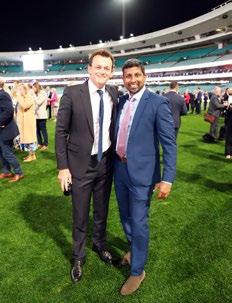
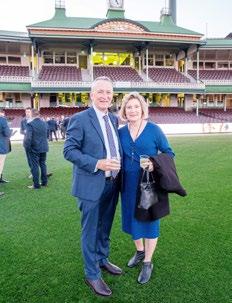

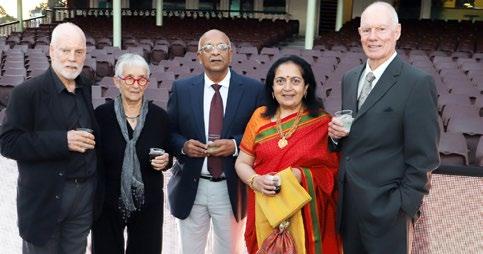

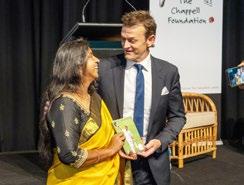

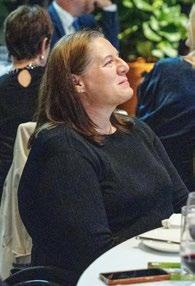



If Melbourne designer Kudrat Makkar
was chasing a pot of gold with her label MASTANI, she found it last month at Australian Fashion Week (AFW).
In fact, she made it her centrepiece as she sent her models down the runway, a giant urn filled with marigolds that became the first – and last – glimpse of her show, aptly titled ‘Heritage’.
With that name, that floral note, and her own background, you’d think her showcase would be a nod to India.
And you would be right, but not entirely. The highlights came from other factors.
The focus here was on slow fashion, sustainability, and ethical practices, every garment meticulously crafted at the in-house MASTANI Atelier in Bengaluru, India.
It became the first solo show by an Indian Australian designer at AFW.
One of the first elements that stood out for MASTANI at AFW 2024, was the diversity on the runway – in terms of ethnicity, age, body types.
“It’s one of the most talked-about

aspects of my show,” Makkar agreed. “I wanted diversity of heritage – all manner of skin tone – and a variety in body size and age. I paid much attention to the casting; that was one of the things that caused the sleepless nights! Not only did I have to source my models from an array of agencies whereas a single agency would have been easier on the purse, I also had to cater for diverse make-up and hair styling!”
While many of her models came from IMG, mature age models came from Silverfox Management, and the African models from Chadwick Models.
Make-up directors were given the heads up to source products for all skin tones, and hair products for all hair styles including the South Asian braid and the African cornrow.
“I wanted some classic silver-haired ladies too,” Makkar revealed. “Kathy Garnaut, a dear friend of the brand, was in the show. She’s in her early 60s and used to model 40 years ago.”
The extra effort went down particularly well, coming in for much appreciation in an industry that prefers Size Six.
The sheer in MASTANI
Besides the wonderful diversity on the catwalk, the diaphaneity in the clothing line

was another highlight.
There was plenty of sheer – in dresses, skirts, pants, jackets.
What attracts Makkar to sheer?
“The luminosity, and the different ways you can wear it – with a bodysuit, a slip, or pants,” Makkar offered. “It’s quite feminine, but with strength of character as well.”
The fragility and subtlety of sheer, as well as its elegance and empowerment, are certainly on-trend.
“Sheer is one of my best sellers,” Makar divulged. “Even though my clients range in age from 35-60, they do not all have model bodies, and some are from conservative cultures. Sometimes ladies pull a garment out for a closer look and hesitate, but when urged to try it on, they end up loving it!”
MASTANI’s signature arms
Makkar’s structured billowy arms, a MASTANI mainstay and a delight to behold, were on offer yet again.
“My signature arm continues to give and give,” she laughed.
The exaggerated curve detail on the sleeve is an immediate identifier of the classic MASTANI garment, and is Makkar’s own personal favourite.
She traces it back to her background in architecture.


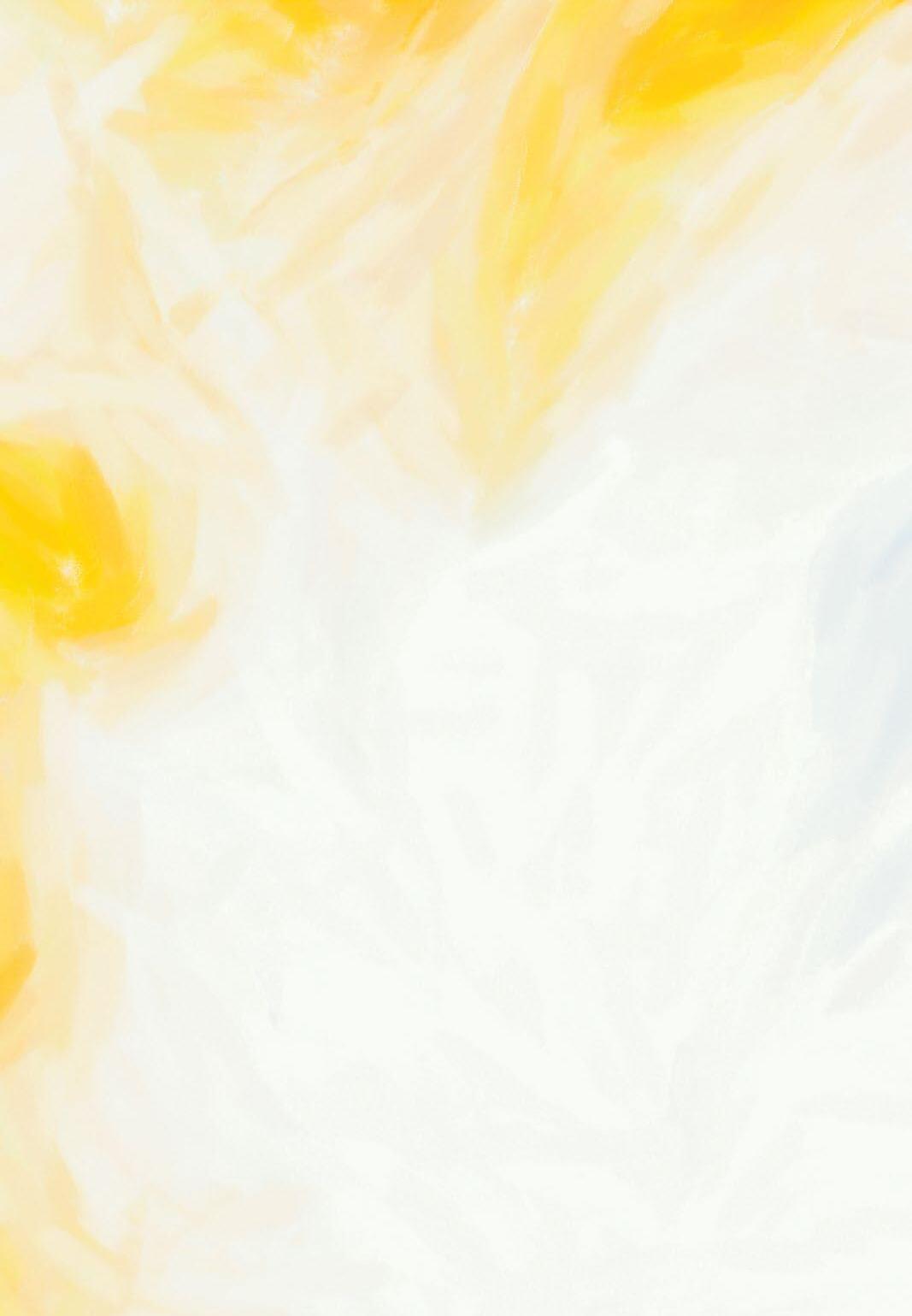 BY RAJNI
BY RAJNI



“It began when I started the brand six years ago,” she described. “Curves were trending then in the interior design and architecture worlds. As a designer, when some women said to me they didn’t want power shoulders as they felt weighed down, I thought why not put the power in the arms instead, by adding an outstanding curve.”
It was a much smoother curve at the start. “Every season I would make it a little puffier, a little rounder. Now I think we’ve struck the right balance. It works on every body type, and I’ve done it now in a sheer fabric.”
MASTANI’s incredible marble prints are made from natural dyes in Bhuj, Gujarat, and all by hand.
“The artisan works with a large tub of water, pours the paint in, and then moves the paint around. The fabric is laid on top, rested for a second to absorb the patterns, and then picked up and put to dry. The beauty of the imperfections add to the allure. The marble effect is quite different to anything which can be created digitally.”
The pastels are another signature MASTANI element.
“This time round the inspiration came from my nostalgia of India and its

celebrations. The rose red comes from the opulence of the royal courts, the greens from gardening with my dad. The blues are a reference to my native Punjab and its five rivers; the gold line is an ode to that early evening light, and the beautiful pink is for Jaipur, where I was married.”
The touch of heritage was also seen in the music, such as the earthy Mahi Ve and Jhoom Jhoom.
Very much a nod to her culture and to her formative years, it is clear why Makkar calls her latest collection ‘Heritage’.
In fact, ‘Heritage Coat’ is the name given to the stunning piece that opened the collection. Equally loved was the fabulous ombre black-and-white pantsuit made from repurposed fabric (see details overleaf).
In other heritage links, Makkar showed off artisanal techniques like hand embroidery, mirrorwork, and the use of pearls – but in a manner practical enough for the Australian consumer.
Makkar has no qualms in describing her target audience: they are women who are “well-settled, professional, welleducated; who understand slow fashion and sustainability; who value what I’m doing; who don’t need to be told the story because they can feel it and see it and understand it and they’re happy to pay for it.”

Kudrat Makkar was a rare India-born designer at Australia’s most significant fashion event. Her brand MASTANI has already presented four times at Melbourne Fashion Festival, and to be invited to present at AFW 2024 is a mark of having arrived. Major industry names came on board, such as Jana Bartolo (styling), Kevin Murphy (hair), Amber Moxey (make up), Steve Madden (shoes) and Christina (DJ).
“I’m quite pleased with how it all turned out,” Makkar reflected. “I figured, for my first time, I’d keep it low – compared to the big budget designers who’ve been doing it for many years. But I think it was the tiny details that worked for me.”
Like the marigolds at the centre. The vase was a giant utensil from a gurudwara (Sikh temple) in Melbourne, weighing 65 kilos. The flowers themselves, not in season, were sourced with much difficulty.
Symbolising vibrancy and positivity, warmth and creativity, power and passion, celebration and auspiciousness, the marigolds stood for the same qualities as the fashion label on display.
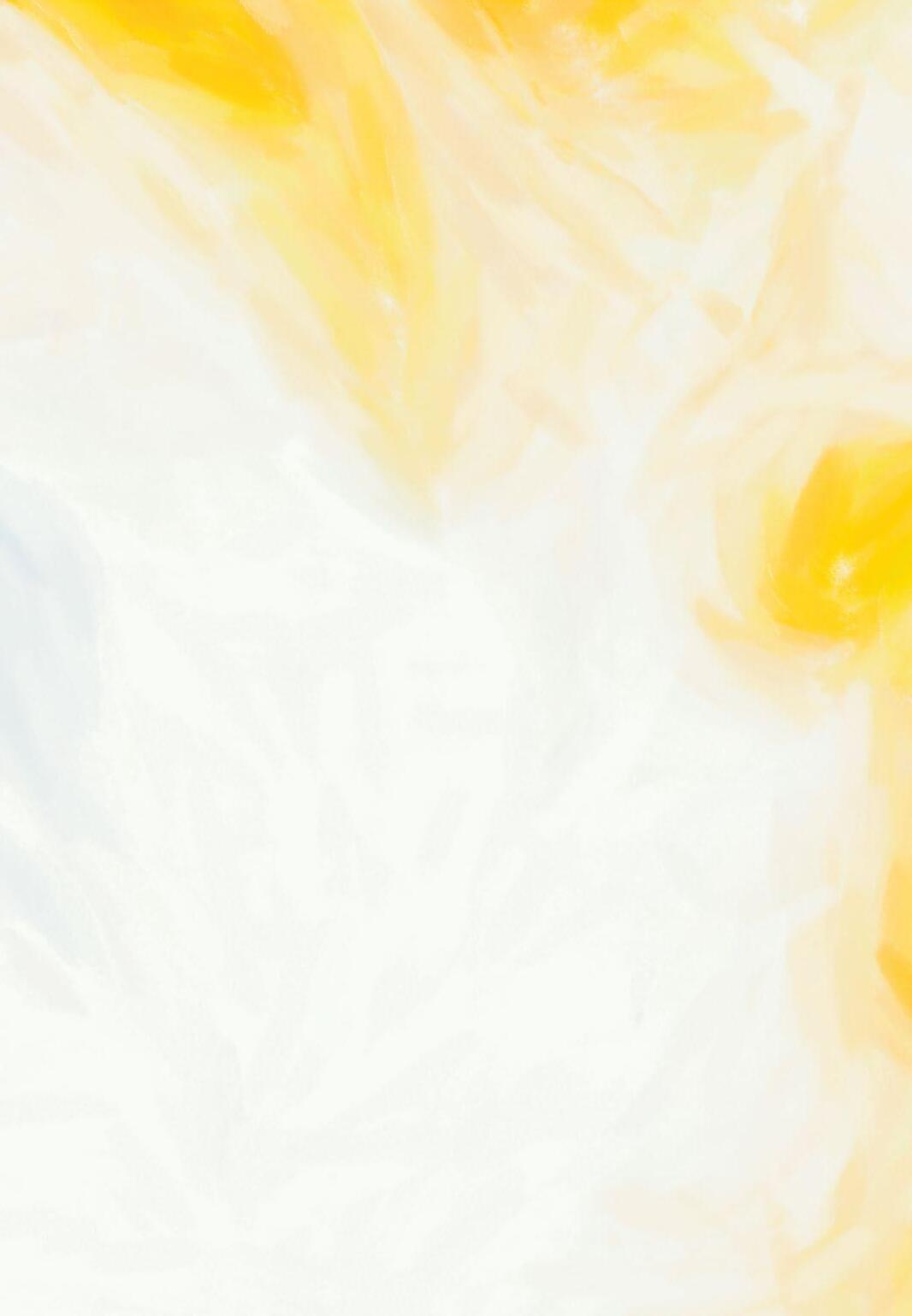
Do you get asked about your brand name MASTANI?
Constantly. Usually that's the first question. Sometimes people think it’s my surname! The name MASTANI of course comes from the Bundelkhand princess whose story has been adapted into many movies and books. She challenged the stereotypes of women in her day, and I hope women feel empowered in my clothing to do the same today. I love to exaggerate the beautiful female form in my silhouettes but strength and confidence are just as important. My choice of fabrics and embellishments bring another dimension – linear hand-piping that creates structural form, sensual fluid silks, complex metallic jacquards reminiscent of armour, glittering mirror-embellishment to ward off the evil eye.
Also, you know, when I was growing up, I was always called that ‘mast’ child. I was always the really bindaaskid of the family. I've always been like that, very carefree.
Whose style do you like amongst contemporary Australian and contemporary Indian personalities?
From India, I would say anyone who's styled by Anaita Shroff Adajania, and anyone by Rhea Kapoor. Rhea styles her sister Sonam Kapoor who always does justice to India. She has that modernity to her, but she can
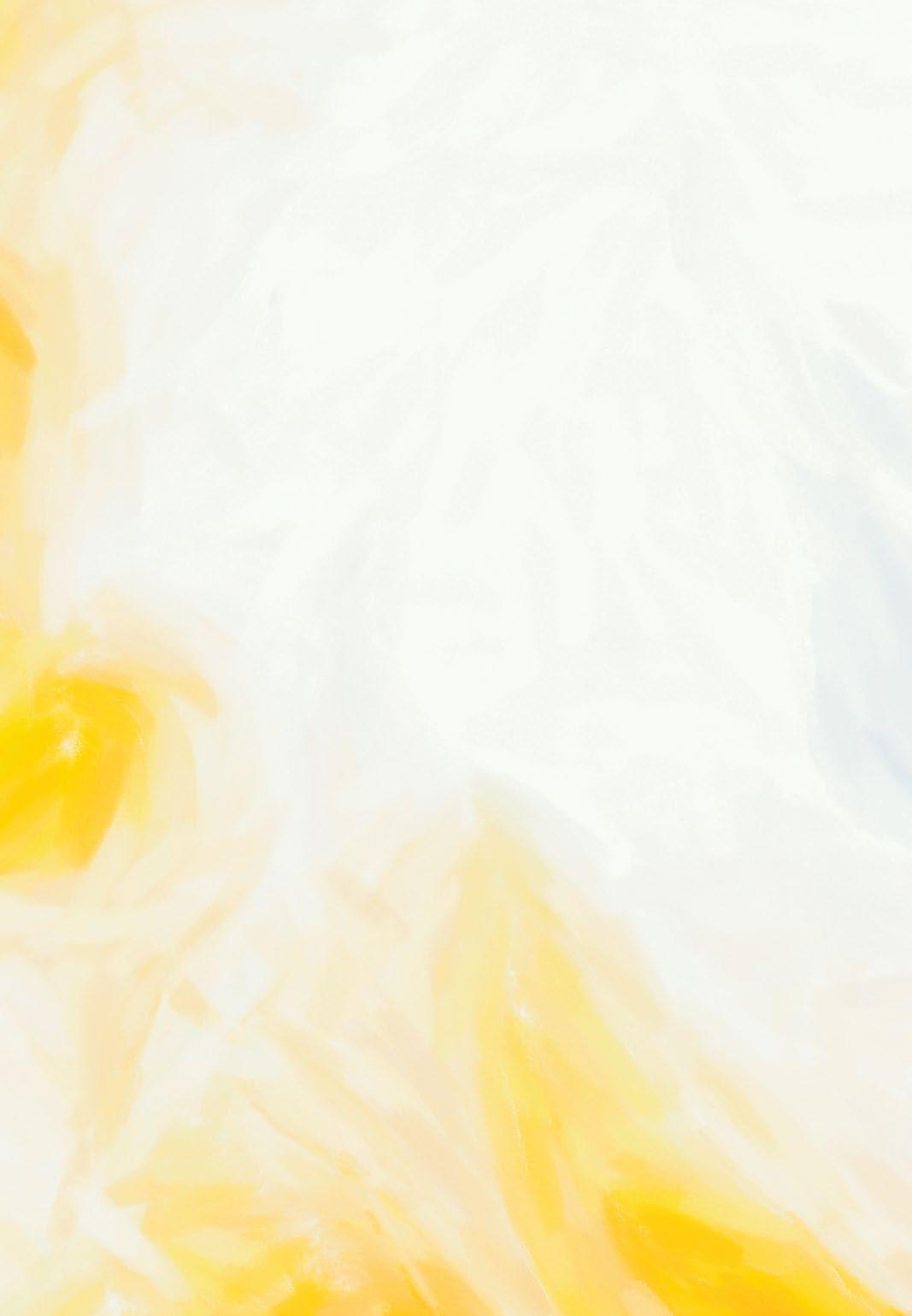 with Kudrat Makkar
with Kudrat Makkar


still be very Indian, balancing it out really beautifully.
From Australia, I've always admired Tina Arena. She's beautiful and carries herself well.
Which Indian personality would you like to do a collab with?
I love Sabyasachi Mukherjee, so hopefully I could do something with him. It could be a very cool collaboration - his style of embellishments with my style of silhouettes.
How do you see slow fashion picking up as a philosophy, say in the next five years or so?
It's already strong. When I started almost six years ago, it was a new trend, like a talk-of-the-town thing; whereas I think now everyone is taking some effort, however small. I always tell the youngsters I mentor, do something, even if tiny, to make a difference in sustainably. Do the ethical thing. I think it is going to take off. The new generation is very interested; they understand the impact for the environment, for our future generations. Kids these days are very smart. They know what to choose and how to make it go a long way, by say repurposing it. And that’s kind of the idea, at MASTANI – the passing on of pieces. I really want to create pieces that people can pass on to the people in their lives.


A stunner in pink handloomed jacquard, Makkar’s ‘Heritage Coat’ has metallic zari woven through it. Created by artisans in Varanasi, the five metres of fabric alone was twenty one days in the making. The inspiration was a digital artwork of a marble print, which the artisans drew by hand, and converted into a punch card for use in the traditional loom. The enquiries have been pouring in for this number, which can become a collector’s item in any wardrobe. Interested buyers will have to wait for their order to be filled though – because this is slow fashion.


Another popular item from MASTANI, this ombre black-and-white pantsuit is made of up-cycled materials. Over one ton (1000 kgs) of textile offcuts, trimmings and unused threads were sent to Paiwand Studio, in Noida, India, where they were repurposed into new handloomed fabrics.
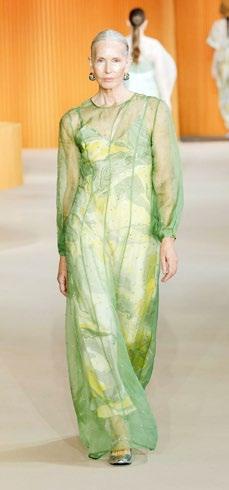
 Kudrat Makkar
Photos courtesy MASTANI
Kudrat Makkar
Photos courtesy MASTANI

Discover the Service NSW Business Bureau program which offers free, personalised support to small business owners, including in-language assistance for Indian speakers.
Running your own small business can be rewarding and challenging filled with unique obstacles and countless decisions. Recognising these challenges, the NSW Government has launched the Service NSW Business Bureau, offering free, personalised support to small business owners.
The Service NSW Business Bureau understands that navigating the world of small business requires more than just determination—it needs access to expert advice and support. Cassandra Gibbens, Executive Director of the Service NSW Business Bureau, highlights the program's commitment: “From getting started, to marketing and managing cash flow, the Business Connect program within the Service NSW Business Bureau provides up to eight hours of free expert, independent, and tailored advice.”
This initiative is particularly beneficial for the Indian community, offering in-language support through interpreters, ensuring that there are no barriers to essential resources. “No matter where you are in your business journey, the Service NSW Business Bureau supports small business owners of all backgrounds across the State, including our Indian community, with inlanguage support through interpreting and translation services,” Gibbens adds. The tangible impact is best illustrated through the success of local entrepreneurs. Jackson Fernandez, owner of Symphony Events, credits his business’s significant growth to the guidance of his Business Connect advisor, Rebecca. “Rebecca has helped me to expand my business significantly and I now employ subcontractors to bring my events together,

which allows me to utilise my time on the business more efficiently,” he shares. Rebecca’s expert advice has been instrumental in transforming Symphony Events. “Rebecca has played a pivotal role in revitalising my business model and the support I have received has been truly exceptional. She guided me through crucial aspects such as trademark information, legal compliance, overcoming challenges,
scaling up my business to the next level and mastering various marketing techniques,” Fernandez continues, emphasising the program’s role in his evolution and recommending its services to fellow business owners, no matter the scale of their operations.
Expert Guidance: Business Connect advisors at Service NSW Business Bureau like Rebecca bring a wealth of experience to the table. They are not only seasoned professionals but also have first-hand experience running their own businesses. This dual perspective allows them to offer practical, empathetic, and effective advice. Rebecca recalls her initial meeting with Jackson: “He expressed he had to manage everything by himself and that there was no way out of this situation. I advised Jackson to establish a structured system within his business, which involved assigning different departments with various tasks and responsibilities.”
Her insights as an experienced advisor reflect a broader understanding of common challenges such as feeling overwhelmed, or burnout faced by small business owners.
“We can provide an independent perspective
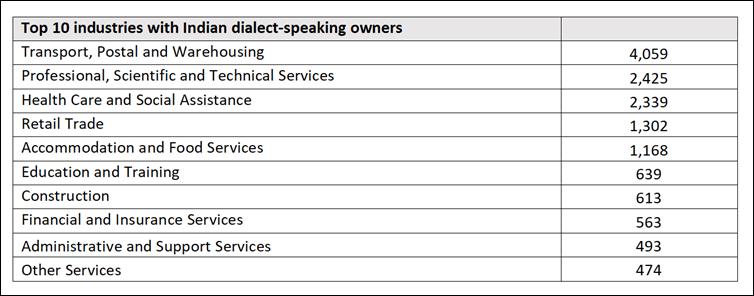
and identify areas of improvement, enabling business owners to manage and grow their business more effectively,” Rebecca asserts.
A Proven Track Record: NSW small businesses employ 1.7 million people, which is around 43 per cent of the State’s private sector workforce. Data from the Australian Bureau of Statistics shows there are around 4,243 small businesses in NSW with owners whose primary language is Hindi, 3,550 Punjabi and 2,801 Urdu.
Since its inception, Business Connect has engaged more than 55,500 small businesses across NSW, delivering over 381,000 hours of support. This includes over 4,600 events on critical topics such as planning, marketing, and cash flow management. Impressively, 96% of customers are likely to recommend the program, underscoring its efficacy and the satisfaction of those who have benefited from its services.
Get Involved: Whether you are just starting or looking to grow, Service NSW Business Bureau offers invaluable resources, including up to eight hours of free, oneon-one advisory sessions. Additionally, the program provides access to events and online resources, ensuring that business owners can continue learning and growing

The NSW Government’s commitment to empowering small businesses is clear, with initiatives like Service NSW Business
For more information on Service NSW Business Bureau, call 13 77 88 or visit service.nsw.gov.au/business/partner. For in-language support, call 131 450 and ask them to call Service NSW Business
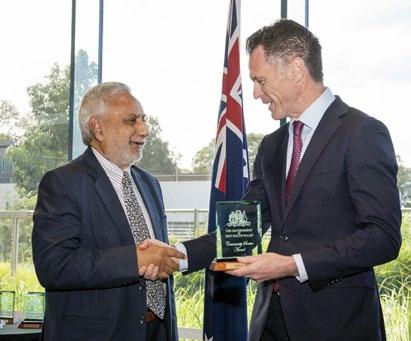
Abbas Raza Alvi was one of the six winners of the annual NSW Government Community Service Awards announced by the state’s Premier Chris Minns on 20 May during National Volunteer Week (20-26 May 2024).
The winners were chosen to acknowledge and celebrate their significant contributions to the improvement of the quality of life of members of their community, and the impact that they have on strengthening it.
Abbas Alvi was recognised for devoting much of his time to volunteering for multiple initiatives, including facilitating the integration of the 120,000-strong IndianMuslim community with Australian society and mainstream Indian diaspora.
Speaking to Indian Link, Alvi expressed happiness for being acknowledged, and chose to dedicate the award to the evergrowing South Asian community of Blacktown and western Sydney.
“I felt very happy and honoured to receive this award,” he said. “It felt even more special because I was the only one among a handful from the Indian community who was in attendance and was recognised. I have been living in Australia since 1989 and have been volunteering my time since the very start for a multitude of initiatives, including improving trade ties between India and Australia, fostering community cohesion and even arts and poetry. This award came as a complete surprise and has pumped me up to keep going. I hope this recognition will inspire others as well.” He called upon more of the Indian community to come forward and volunteer their time. “For many of us Australia is our karm-bhoomi where we have migrated to for better work opportunities etc. I strongly believe we should all contribute a bit of our time to give back to this wonderful country. There is so much to do – be it helping during natural disasters, fires and floods, health, education, clean-ups, blood donation to name just a few,” Alvi said.
Appreciating the ‘giving’ nature of the Indian community Abbas Alvi observed, “I know so many of us do volunteering or ‘sewa’ at our respective places of worship. It’s part of our nature. It is satisfying and
NSW’s Abbas Alvi and SA’s Manju Shelke took home awards at National Volunteering Week
one feels charged up helping others. We are lucky to be in Australia where volunteering is so organised and there are so many opportunities, and I urge more from the south-east Asian community to serve in the mainstream.”
Abbas Alvi appreciated the selfless work being put in by volunteers in Western Sydney. “In many ways, Blacktown and the larger Western Sydney belt has become the hub of migrants. Many of them are stepping up to solve the issues affecting the larger population, including transport and health. Their efforts should be recognised,” he said. Alvi, a seasoned community leader, has been at the forefront of many firsts for the community. Not only has he facilitated multiple interfaith dialogues, seminars, and discussion forums in Sydney and other cities across Australia for fostering community and social cohesion, but he also spearheaded the establishment of the Australia-India Chamber of Commerce (NSW) as its founder and president.
He proudly refers to Indian Crescent Society of Australia Inc (ICSOA) a community-based not-for-profit organisation representing and networking Indian Muslim migrants in Australia founded by him, which has over 122,000 Indian Muslim members across Australia. As its current president, he says one of the key events of the organisation is the annual Interfaith event held each year at the NSW Parliament.
With his own interest in arts and poetry, Alvi produced Rahat, a collective effort involving 65 Australian creative artists from 12 ethnicities dedicated to fostering community cohesion, peace, and harmony, which was launched at the NSW Parliament in 2022.
Earlier in 2010, he had released Guldasta – a poetry compilation featuring the works of 47 Australian poets in Urdu and Hindi. The collection advocated for a united world, peace and harmony, and supporting creative projects in Australia.
WAACI (We Australians are Creative Inc), a not-for-profit Australian organisation of which Alvi is founding director, is networking creativity in Australia. It believes that creativity has no boundaries, limitations, nationalities, religions, colour, racial differences, or any other barriers humans erect around themselves. “We share and network creativity with established as well as new artists, and support emerging
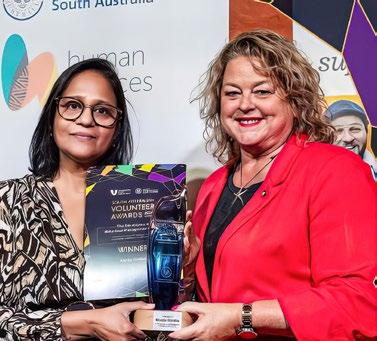
creative artists to promote their work,” Alvi explained.
Abbas Alvi has also represented Australia as a delegate at NRI (Non-Residence of India) and PIO (Persons of Indian Origin) conferences in India, advocating for the interests and concerns of Indian migrants in Australia.
Tarini Puri
Walking along the serpentine corridors of the Royal Adelaide Hospital, Manju Shelke knew she was lost. As she stood looking around, an older woman asked her if she could help.
“I don’t think you could,” Manju remembers saying. But the other woman insisted and helped her get to her specialist appointment.
When Manju came out of her appointment, the woman was waiting and assisted her out of the hospital too.
This was about 10 years ago and Manju’s first encounter with a hospital volunteer. A couple of years later she saw a job advertisement for Office Manager at the Lyell McEwin Hospital Volunteer Association and applied out of curiosity. And thus began Manju’s association with the Volunteer Association where she is now Director. Last month Manju Shelke received South Australia’s Excellence in Volunteer Management Award.
This is the State’s highest volunteer management award recognising a volunteer manager for their outstanding contribution to the profession. It is presented to a Volunteer Manager who has demonstrated dedication to good practice in volunteer management, the delivery of volunteer programs and quality volunteer experiences.
Manju Shelke, as Director at Northern Healthcare Volunteer Association, manages over 250 volunteers and the volunteer operations at Lyell McEwin and Modbury Hospitals, Northgate and James Nash House.
Manju Shelke reviews the programs and identifies opportunities where volunteers can best support the needs of the health system and be most helpful in a patient’s recovery.
The Association was also recently part of an independent audit which measured the organisation against three sets of international volunteer management standards and were found to be in the top 2.5% of volunteer agencies internationally!
Manju Shelke’s personal story and journey to Adelaide are both fascinating. She started her career in India at the Taj Group of Hotels as a Sales manager after completing her MBA. She then moved to Dubai with her husband and three-yearold daughter. Knowing that a job in the hotel industry would mean long and late hours, she re-trained as a journalist in the UAE. The family next moved to New Zealand where she continued her career in journalism.
Manju moved to Australia to be with her daughter who was pursuing her medical studies in Adelaide. Here life dealt a big blow in the form of throat cancer. Manju lost her voice for 8 months and went through extensive treatment and rehab to be able to speak again.
But this, as we have seen, in a strange way, led to her current job.
She is passionate about the work the volunteers do.
“Volunteers provide a level of care that specialists cannot especially in the areas of social support, palliative services, rehabilitation services etc,” she told Indian Link.
One of the services she is particularly proud of is the “Biography Service” where a volunteer speaks to a palliative care patient’s relatives and friends and writes their story. This is beautifully produced in a booklet and given to the patient or their relatives.
She also revived the “Comfort Care” program where volunteers can cuddle, read, sing or just sit with infants or children to provide support and care.
There are several other programs both within the hospitals and outside that volunteers contribute their time to.
Manju said of her award, “I am truly humbled and honoured by the recognition. I am inspired every day by the dedication of our compassionate volunteer team.”
Looking to the future, she would like more people from multicultural backgrounds to go into hospitals as volunteers. “I feel we have a lot to give (in this area), and can make a huge difference.”
Vinaya Rai

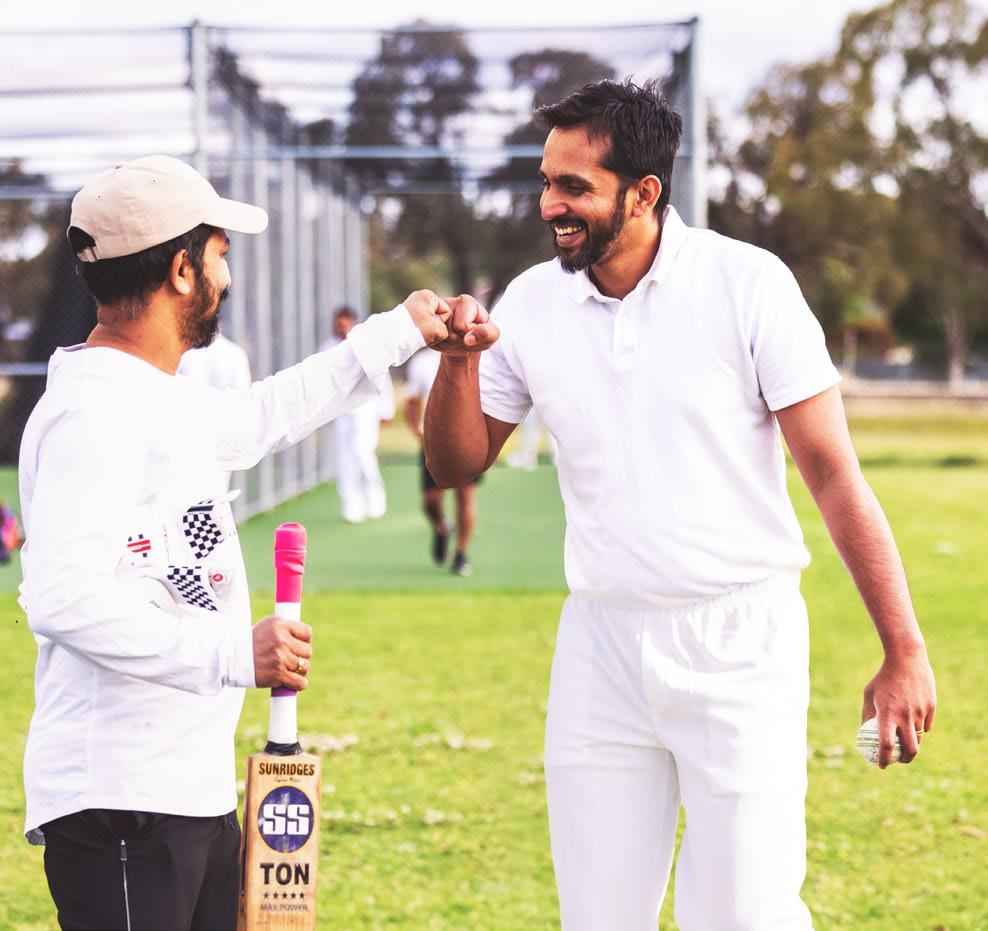
… and what it thought of him, in Australian writer Thomas Weber’s new book
 IBY PRUTHA CHAKRABORTY
IBY PRUTHA CHAKRABORTY
n 1896, when Mohandas Karamchand Gandhi was working for the cause of his countrymen in South Africa, he first referenced Australia in his writings. And it was not in a positive light.
In August of that year, Gandhi published a document titled ‘The Grievances of the British Indians in South Africa: An Appeal to the Indian Public’. It included a critical observation: “In Australia, they are endeavouring to pass laws to restrict the influx of Indians in those parts.”
Gandhi also communicated this concern to his political mentor, GK Gokhale, noting the possibility of such restrictive legislation receiving “Royal sanction”.
In a new book, Gandhi’s Australia, Australia’s Gandhi, author Thomas Weber examines such connections between the revered Indian leader and the White Australia’ of his times.
“Quite a lot has been written about Gandhi and his relationship with Britain and America,” Weber begins to tell us why he wrote the book, which is published by Orient Blackswan. “Australians tended to follow the attitudes of the British as most still saw themselves as patriotic members of the Empire. However, I wondered whether there was more going on in Australia than the mere parroting of British concerns.”
This set the ball rolling for Weber, who waded through tens of thousands of newspaper entries about Gandhi in the Australian press during his lifetime. The result is this fascinating book, which takes readers on a journey examining Gandhi’s perceptions of Australia and the ways in which Australians came to understand him.
Gandhi’s Australia
During his time in South Africa, Gandhi fought for the rights of Indians to obtain the benefits of full citizenship. Not many know this, but it was also during this period that the young Gandhi shaped his views on Australia.
“He saw that the racist South African colonies were taking lessons from the then even more racist ‘White Australia’ that he criticises firmly in his writings,” Weber explains.
So, how did Australians perceive Gandhi back then, we ask.
“Australian attitudes to Gandhi tended to reflect those of Britain – the ‘Mother Country’,” Weber tells Indian Link. “When he was leading civil disobedience campaigns

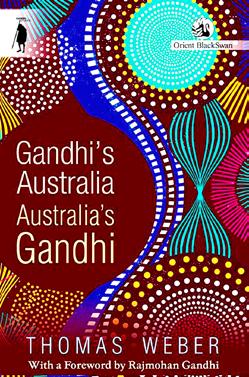
against the British, he was vilified. But when he was doing constructive social work, the British praised him and this was reflected in the Australian press.”
Interestingly, the Australians who visited Gandhi in India or in London tended to come away with very positive attitudes towards the Mahatma, often noting the unwarranted bias of the press.
Weber’s book also covers Gandhi’s influences on various movements in Australia, such as peace, environmentalism, religious tolerance, and aid. It focusses on several protests and social justice movements that clearly referenced Gandhi and Gandhian techniques.
“The Melbourne Rainforest Action Group, which did much to highlight the destruction of Asian rainforests by shipping timber from there to Australia, may be a key example,” adds Weber, who is an Honorary Associate, School of Humanities and Social Sciences, La Trobe University, Melbourne.
Gandhi, the guiding light
Melbourne-based Weber has previously written On the Salt March (1997), Gandhi as Disciple and Mentor (2004), Gandhi, Gandhism and the Gandhians (2006) and Mentor and Going Native: Gandhi's Relationship with Western Women (2011).
“During my years of thinking and writing about Gandhi, I have visited India at least a dozen times, totalling something like three years at Gandhian institutions, libraries with substantial Gandhian resources, and in the company of Gandhians,” he writes in his latest, Gandhi’s Australia, Australia’s Gandhi.
While researching for this book, in

particular, Weber made two significant discoveries related to Gandhi and Australia.
Firstly, Australians who visited Gandhi reported positively about him.
“Secondly, the relatively few books written by Australians about Gandhi were not limited to the general biographies that one could expect, but in many cases were substantial additions to the literature,” Weber reveals. “The scholars of Australia have been punching above their weight.”
This year marked the 76th death anniversary of Mahatma Gandhi. Weber feels that the world, not just Australia, seems to have currently turned its back on Gandhi’s legacy.
“There is little talk of nonviolence or simple living at the moment,” he shares. “But Gandhi's legacy is for the ages, and I am sure that if we are to have sustainable and more equitable future, things will turn again and his relevance will sometime again be seen as an important guidepost.”
And therefore, this writer feels, Weber’s book has come at the right time to help the diaspora in Australia understand more about Gandhi’s contributions.
“Indians are now one of the, if not the, largest migrant groups in Australia. I think that the biggest impact of the book may be its potential as something of a bridge between India and Australia,” Weber says. “Many Indian parents who have children born in Australia are anxious to ensure that their culture and heritage are passed on to their offspring. For this reason, they organise Hindi language and Indian dance classes, they celebrate Holi and other festivals and organise functions on the Mahatma's birth and death days. This book may be part of this process and may provide knowledge for those in India contemplating relocation to Australia.”
If you’re coming to Australia for the first time, be prepared to be shocked by specific sporting facts – some of which might disappoint you if you’re a cricket fan.
Growing up in India, I believed – like many others around me – that Australians are very much into cricket. They have, after all, won 10 major ICC trophies, which is the most by any team.
Very soon after my arrival in Melbourne in July 2023, I noticed one day that people were heading into the Melbourne Cricket Ground in large numbers. As a cricket fan, I wondered: is a cricket match on today? How come I did not know?
I asked a group of people, is there a cricket game on at the MCG? A guy wearing a red scarf with ‘Demons’ written on it said, “Mate, we are heading for the footy, not cricket.”
I pretended I knew what ‘footy’ was, and said, “Hope you have a good time.”
Soon I learned that the most prominent sport people follow in Australia, especially in Victoria, is Australian Football League or AFL.
My first AFL experience was on TV: the 2023 finals between Collingwood and Brisbane Lions.
Why call it ‘football’, I wondered, if players can use their hands?
I began reading the rules and regulations of this game, and told my dad on the phone once that the MCG is actually more famous for footy than it is for cricket.
Coming from India, settling into Melbourne can be arduous; I knew I had to step out of my comfort zone. Sport has been a major part of my own life, and I was lucky it offered me a great way to connect.
I’ve learned now that in Victoria, people can eat, share, and breathe footy.
I got to see my first game at the MCG recently, or ‘the G’ as they call it here. An Indian friend asked if I’d like to go for a Melbourne vs Geelong game; I said yes immediately. Who wouldn’t want to watch Max Gawn?
The energy was significantly different to the last time I was at the G, Boxing Day test match. At the footy, you can feel the hunger of the crowd.
The rivalry between the Demons and the Cats is terrific. Until last year, I had only heard about it. But this year, I witnessed it first-hand.
The team colours turned the crowd into a sea of red, blue, and white. Luckily I was wearing a red hoodie, and my friend, who
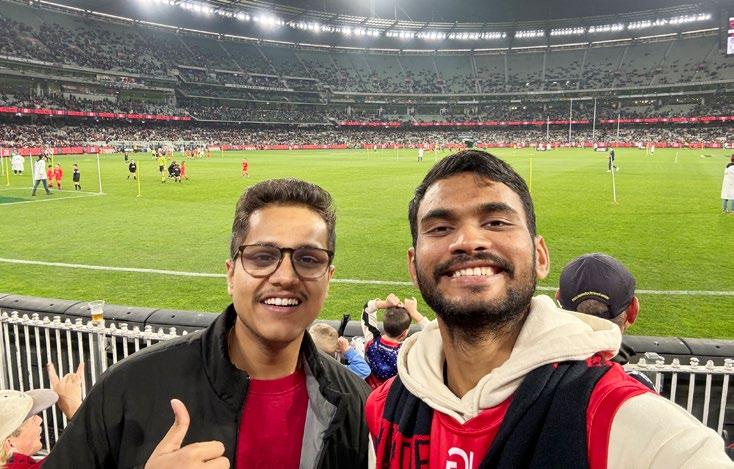
Confusion. Then celebration. Because this was a welcoming environment free of judgment, writes JAI TIWARI
had already been for a few games, wore a Demons scarf.
I was witnessing a beacon of Aussie sports culture.
It was Melbourne’s home game, and their people vibed with the theme song, It’s a Grand Old Flag It’s a High Flying Flag. I was surprised to see my Indian friend join in!
Everyone in the stadium held a frothy glass of beer in their hand and cheered for the Demons. Some fans came from Geelong to support the Cats.
The feeling was surreal when the ball was tossed in the air and the game started.
The sight for a first-timer was absolutely invigorating, because people were so emotional. The unknown crowd made me feel like I was their own, and I forgot that this was my first game. People next to me were explaining the nuances, their only demand being to cheer whenever Melbourne scored.

A few Geelong supporters were sitting behind me, and when their team scored, they showed the same enthusiasm as the Melbourne fans.
Since it was my first game, I asked my friend to take a picture so I could share it with my family back in India.
Out of nowhere, a Melbourne fan enthusiastically jumped into the frame and photobombed us. The gentleman then shook my hand warmly and laughed, instantly striking up a friendly conversation.
As we chatted about the game, I felt as if I had known this sport for ages. His eyes widened when I revealed this was my first game. This spontaneous and heartfelt interaction made me feel genuinely welcomed, and underscored the incredible sense of community and passion that defines AFL fandom.
Melbourne won the game. Bayley Fritsch booted the final goal in the fourth quarter.
As soon as the full-time whistle was blown, the crowd was on their feet, dancing like no one was watching. My friend, a Melbourne supporter, was well prepared and sang Melbourne FC’s anthem.
When I heard my Indian friend, a keen cricket follower like me, I knew he was a Melbournian at heart.
Since then, I’ve embraced footy, realising that sport makes unbreakable bonds, connects people effortlessly, and creates a welcoming environment free of judgment in Australia.
The one vital rule for a first-time watcher is that if you don’t have a team to support, other fans will help you select your team, which you must make a pact to support as long as you live!
My AFL experience made me forget that I am miles from home; even with complete strangers around me, I became a part of the crowd.
The Department of Planning, Housing and Infrastructure wants your feedback on the proposed changes to the site on the northern side of St John’s Cathedral, Parramatta.
The changes are outlined in an ‘explanation of intended effect’ document, which is on our website: planningportal.nsw.gov.au/stjohns
Have your say by 5pm Monday 24 June 2024.


ADITYA GAUTAM is a Noida-born, Melbourne-based stand-up comedian and author of ‘Pornistan: How to Survive the Porn Epidemic in India’. He was a state finalist at the 2020 RAW Comedy competition and is the co-founder of Multicultural Comedy.

You’ve described yourself as an introvert but within eight months of starting stand-up you made it to the RAW comedy finals – what changed?
I’m an introvert, always will be. Nothing has changed. What they say about introverts is that talking to people drains our energy… I realised if I'm talking about something I'm feeling passionate about, then I want to talk, I just don't want to have a conversation. I just want to moan a lot, so standup comedy is perfect… it's not a conversation. I get up on stage. I tell people what I think about things and then I get off!
Obviously, there's still an aspect of being on stage and everybody looking at you which I still struggle with after having done it for about five years. If I don't do it for a few weeks, I feel very nervous, it doesn't come naturally. But another reason why I started stand-up was because I thought this is something I can beat.

term ‘porn epidemic’. What do you mean by this?

If you do a rudimentary search on a porn website, what you see is not normal sex. That’s not how you want an entire population learning; it’s very damaging. A doctor I interviewed for this book had a perfect expression: ‘Watching porn for sex education is like watching The Fast and the Furious to learn driving.’

You’ve written a book about porn, and your debut show, ‘Don’t Call Me a Papadum’, is based on a racist incident you had in your early years of migrating. What draws you to such difficult topics?
When I think about doing any art related endeavour, the likelihood that you'll make money from it is very low. So, your driving force can never be, ‘I'm going to make money out of this’. I wrote that book because I really wanted an 18-yearold me to have that book to tell them the downsides of pornography. Same with the comedy show, I wanted to tell people about the Indian perspective of life in Australia, for non-Indians to
[story] sounds great, but how do you actually make it funny? It’s super hard and to be honest, I'm still learning how to do it. I still haven't mastered it. There are times when I'm doing the show where I can see people are struggling to find it funny... it's a hard balance.

What's something that you're currently listening to/reading/ playing/watching?
Someone I’ve only recently started listening to but is already one of my all-time favourite comedians, is Mike Birbiglia. I’ve been listening to his shows and watching his documentary.
I'm obsessing about Indian elections these days. I even made a couple of jokes. Indian politics is the most entertaining thing that could ever be, so if you follow that, you don't need books or Netflix subscriptions - there’s just so much happening in it all the time!


Around 2010, Reliance came up with Jio, and started giving away very cheap broadband across India…right now, 5G internet [in India] is one of the cheapest on the planet. When I was studying, there was zero sex education; there was this one stupid little chapter about sexual organs which our teacher skipped. Still in India, there is very little sex education, but easy access to high-speed pornography. Combine the two and you have a porn epidemic, where everyone’s accessing pornography to understand sexuality and fulfill their desires to know more about sex.

What’s a word that you like in a South Asian language, and what does it mean? There's a local community in Noida, Gujjars, and we use a lot of their words in our Hindi as well. So, this word that I absolutely love is called ‘Bhasaad’. There's no exact word for it in English, which is what makes it beautiful… It's this feeling when there’s too much happening, that’s ‘bhasaad’.
I would say ‘bhasaad’ if someone asks me ‘how's life going these days?’ Or if you went to the mall: ‘How was it?’ ‘Well, there was bhasaad in the mall’, like, there were too many people.
And finally: Soan Papdi or Papdi Chaat?
Soan Papdi, because I’m not a chaat fan, which is a controversial thing to say for someone who lives around Delhi. I’m not a fan of Soan Papdi either but if I’m given an option, I’d choose it over Papdi


Well established this Highly respected clothing alterations BUSINESS IS FOR SALE potential to purchase building as well Or long lease available. Large % is alterations to bridal & Deb dresses. Also formal wear & basic alterations – hems, zips etc. SOME WEDDING DRESSES & SHOES MAYBE INCLUDED. Sale due to retirement. PRICED TO SELL AT $67,500
Enquire to exclusive agent: CALL MARY ON 0418 323 420


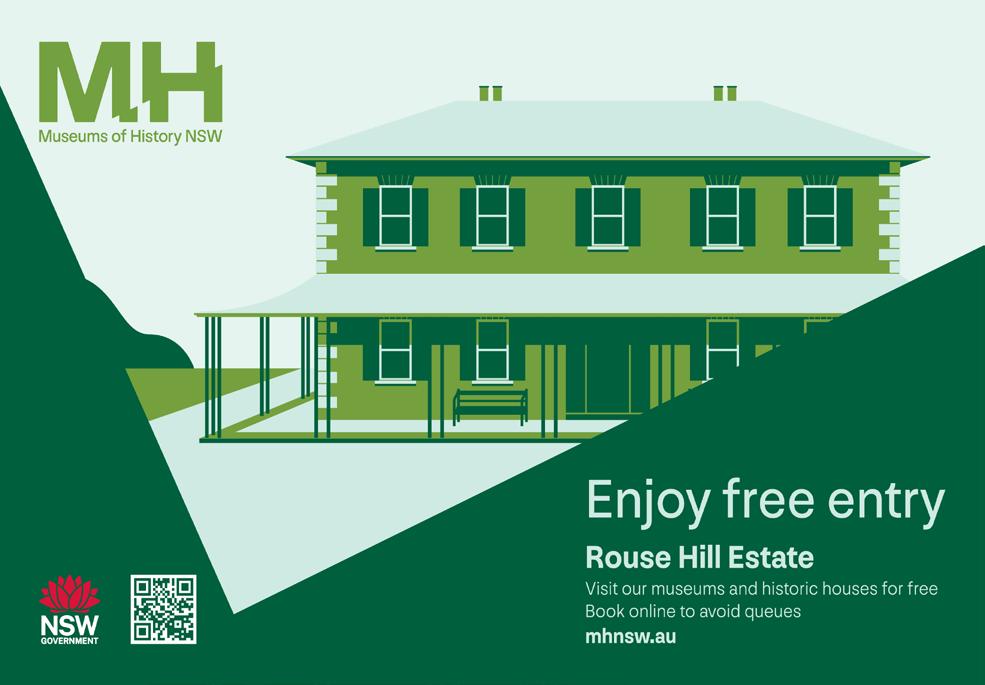





























To shallow fry
n 5 quail, cut in half lengthwise (refer notes)
n ½ tsp turmeric powder
n ½ tsp red chilli powder
n Salt, to season
n 2-3 tbsp vegetable oil
To make masala
n 2-3 tbsp vegetable oil
n 2 bay leaf
n 1 black cardamom
n 4 green cardamom
n 4 cloves
n 1 inch cinnamon bark
n 3 dry red chilli
n 4 red onions; thinly sliced
n 2-3 green chilli (based on heat preferences)
n ¼ cup fresh mint leaves
n ¼ cup fresh coriander leaves
n 2 large ripe tomatoes; sliced
n 1 tsp crushed ginger
n 1 tsp crushed garlic
n 1 tsp red chilli powder
n ½ tsp cumin powder
n ½ tsp fennel powder
n 1.5 tbsp coriander powder
n 3 cups water (refer notes)
Garnish
n 3 sprigs fresh coriander leaves; finely chopped
n 1 tsp lemon juice
METHOD
To shallow fry quail
n Cut the quail in half lengthwise, clean and wash well. Allow to drain.
n Marinate the quail with turmeric and chilli powder for 10 minutes.
n Heat oil in a pan and shallow fry the quail on both sides for 2 minutes each. (Refer notes)
n Keep aside.
To make masala
n Heat oil in a large wok/kadhai and add bay leaf, green and black cardamom, cloves, cinnamon and dry red chilli. Fry for 30 seconds on low heat.
n Next add the onions, green chilli, coriander and mint leaves; sauté on medium heat till the onions are soft and translucent, just starting to take on the golden brown colour.
n Add the ginger, garlic and tomatoes; sauté till the rawness of the aromatics goes away and the tomatoes are soft and mushy.
n Next add cumin, coriander and fennel powder; mix thoroughly and continue to cook till the mixture comes together and oil starts to leave from the edges.
n Add water and bring to boil.
n Finally, add the shallow fried quail, mix well. Taste and season with salt if necessary. At this point, you can also add more green chillies or chilli powder if you prefer it spicy.
n Continue to cook on low heat till the quail is soft and tender. Took about 12 minutes but this will depend on the number and size of quail.
n Remove from heat and add lemon juice and coriander leaves. Stir through and keep covered for 15 minutes before serving.
Notes:
n The quail can be cooked whole, cut in half lengthwise or cut into smaller pieces.
n The quail can be deep fried too if you prefer that texture.
n The amount of water can be increased or decreased depending on the preferred consistency of gravy.
The smaller, gamier cousin of chicken, shallow fried with masala, pairs well with ghee rice
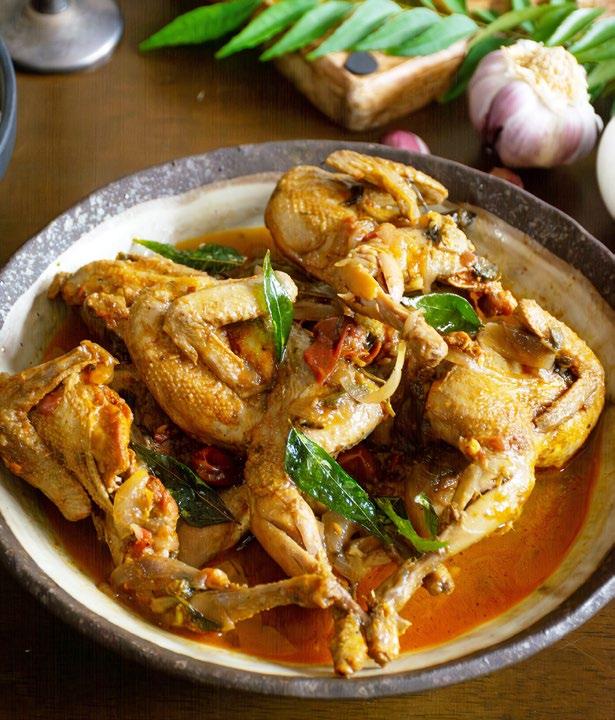
 ABY DHANYA SAMUEL
ABY DHANYA SAMUEL
traditional preparation from Tamil Nadu, this dish is a must try for all quail lovers.
The gravy is mildly spiced and light but packs much flavour from all the whole spices and aromatics. Quail meat is often considered to be a delicacy. While it is similar in flavour to chicken, duck etc, it has a deeper and more
intense flavour with a hint of wild game note to it. Also, being a smaller bird, it has almost an equal ratio of meat to bones.
The meat is darker and more comparable to duck rather than chicken which has white meat. It’s denser and hence, the cooking method chosen must be suitable to accentuate the true flavour of the meat.
To make this dish, the meat is first shallow fried and then slow cooked in a gravy with spices and aromatics. This helps keeps the meat juicy and tender.
This quail masala is as much about the spices as the meat.
The ingredient list might read long but it’s just a handful of whole spices, so making this dish is pretty simple. It’s the spices, both whole and powdered, that lend the layers of flavour to the gravy. It also enhances the taste of the quail meat,taking away some of its gamey-ness yet retaining the flavour of the meat.
The best combination for this quail masala is ghee rice. Aromatic rice cooked with ghee and spices is a heavenly rice dish - it’s a must try. You could also pair with chapattis, rotis, appams (hoppers) etc.
The Indian links in the island nation of Mauritius are just as fascinating as the breathtaking natural panorama and the tranquil atmosphere

 ABY SANDIP HOR
ABY SANDIP HOR
s my Air Mauritius flight from Perth to Mauritius begins cruising high in the sky, I once again get immersed in the pages of one of my favourite novels, Sea of Poppies.
Written by the famous Indian American author Amitav Ghosh, this book narrates the tale of indentured labourers from India transported by British colonisers to the Indian Ocean island of Mauritius to work on sugar plantations.
The volcanic island, situated some 2000 km off East Africa's southern coast, was uninhabited until the Dutch reached its shores in the 16th century. They named the island Mauritius, honouring their Prince Maurice van Nassau. They departed soon enough, making way for French colonisers to move in and make use of the island’s fertile soil to cultivate sugarcane. The worldwide demand for sugar at that time was high. They forcefully acquired labourers from neighbouring African countries like Madagascar, and introduced a torturous regime of slavery, which ended after the British won the naval war against France in 1810 and gained sovereign control of the island.
As the demand for sugar remained high, the British wanted to expand the sugarcane cultivation in Mauritius and other colonies but struggled without a proper labour force. So,
in 1834 they selected Mauritius to be the first site for what they called ‘the great experiment’ in the use of ‘free’ labour to replace the slaves. Between 1834 and 1920 nearly half a million people from their colony in India, both men and women, arrived in Mauritius. The book Sea of Poppies narrates the story of this journey across the Indian Ocean.
This history comes alive when I visit the UNESCO World Heritage listed Aapravasi Ghat in Port Louis – the nation’s capital city. Earlier called ‘Coolie Ghat’, it was at this waterfront location that the boats with the labourers, derogatively called ‘coolies’ by the British masters, touched shore and their arrival recorded, before they were sent on to the plantations. Some were later transported to other British colonial destinations in southern and eastern Africa, Caribbean or in the Pacific. A multi-media display inside a museum on site provides interesting information on one of the world’s largest migration of humans and the entire precinct with some buildings from that period is deemed as the starting point of the modern-

era contract labour system.
The population of Mauritius is around 1.3 million and an estimated 70% of them are descendants of early migrants from India. The majority are Hindus. As a result, the island reflects strong Indian culture and hues of Hinduism in almost every corner. Criss-crossing the island, I notice several temples belonging to various Hindu gods and goddesses from Shiva and Hanuman to Durga to Kali, see more saffron streamers fluttering than Mauritius national flags, hear radio jockeys playing the latest Bollywood hits, and find local taste buds strongly linked to spices.
While the land is occupied by descendants of other early settlers as well, like the Europeans and the Africans, the Heads of State and other key position holders in the government have been in the pockets of Indian-origin leaders, since the island’s independence from the British in 1968. But there is no racial refinement, all citizens living harmoniously as Mauritians. English is the official language, but all speak Creole
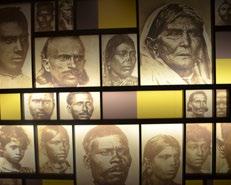
(a broken version of French), celebrate Christmas and Eid with same level of enthusiasm as Maha Shivaratri which is a national festival, enjoy swinging hips with African music and relish eating dholpuri (Indian puri stuffed with lentils and served with curried potato). They echo the true colours of a Rainbow Nation, and I get the first taste of this during my Air Mauritius flight to the African island. Later when browsing with the crowds along the corridors of the Central Market in Port Louis, the vibrant colours of the fresh fruit and vegetables reflect in my mind the diverse colours of their multiculturalism.
The history and cultural insights of Mauritius are eloquently stored in the galleries of many museums dotted in Port Louis, the Blue Penny Museum. National History Museum and the Museum of Slavery generally command attention of the historically minded.
Beyond the capital, another site of significant cultural value is the Le Morne Mountain. Presently a UNESCO World Heritage location, it was a hideout for the slaves many of whom kissed death by jumping from the top to save themselves from the unbearable torture of their masters. While there, it’s hard to keep the eyes dry when thinking about the plight of the slaves.
While the history and culture of Mauritius are invigorating, its commanding drawcard for visitors from around the world is its stunning natural panorama and the engulfing serene environment.
Surrounded by 300 km of coastline,

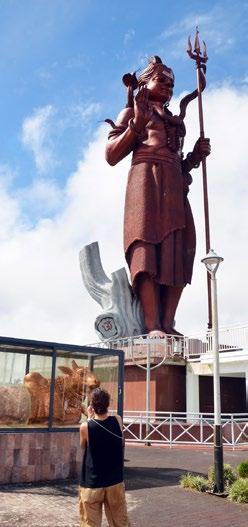




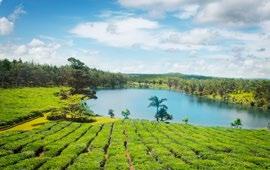


the inland landscape is marked by endless stretches of lush green sugar plantations, tea gardens and sprawling national parks adorned with gushing waterfalls and coloured rocky formations, recognised as geological wonders. A series of rugged mountain peaks overlooks the scenery below.
This natural panorama blends with the clear blue sky, fresh air, warm tropical climate and unhurried lifestyle, to make Mauritius ideal for anyone keen to slow down and relax, recharge their mind, body, and soul and have a good time with family and friends or just by themselves.
To welcome this band of holiday makers, the island is dotted with numerous dreamy resorts, their high number within a relatively small land area inspiring the nickname ‘Resort Island’.
Nestled within spacious and lush tropical gardens with the sandy coastline almost at the doorstep, these resorts are set up in isolated locations embracing comfort and luxury with rejuvenation and wellbeing facilities. Mauritius is a small island, only 45 km in width and 65 km in length. So, it doesn’t really matter where you stay - it’s easy to add excursions to any part of the island to mix history and culture with natural activities involving sun, sea and sand, and capturing underwater scenery by diving and snorkeling to adventure journeys through the national parks.
Sequels. Anticipated third seasons. A spooky thriller. Regional films. There's plenty on NEERU SALUJA’s watchlist this month.
BRIDGERTON SEASON 3, PART 2 (Netflix)
Will Pen say a yes to Colin’s marriage proposal? Will she reveal her identity of being Lady Whistledown? How will Eloise react to this news? Bridgerton fans, we know you are on the edge of your seats after the romantic and steamy carriage ride. The wait is over as Part Two of Season 3 is almost here, featuring our favourite Simone Ashley as she returns from her extended honeymoon.
Releasing 13 June

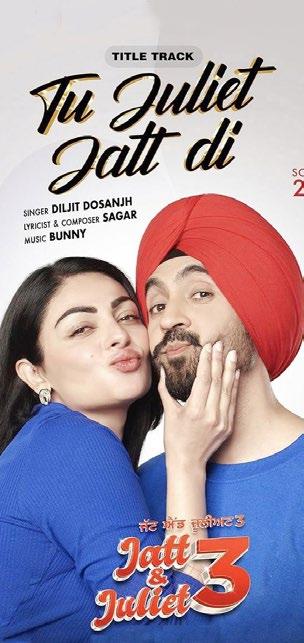
JATT AND JULIET 3 (In cinemas)
Punjabi heartthrobs Diljit Dosanjh and Neeru Bajwa (Fateh and Pooja) are back with their never-ending banter, embarking on an adventurous journey filled with new challenges and hilarious misunderstandings. This romcom will be a treat to watch!
Releasing 27 June
SEEKING GROOMS
Indian-origin, professionally qualified, issueless match (working professional, not selfemployed) from Australia for ’88-born 5’3" Hindu Punjabi girl (divorced, issueless), working with a government organisation in Sydney. Must have Aus PR, and be a non-smoker and preferably teetotaller. Email biodata with photos, parents’ contact details to: matrimonial.ml@gmail.com
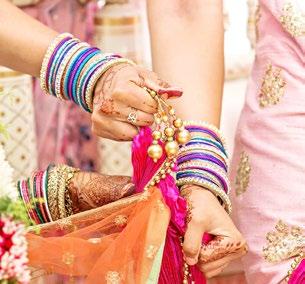
MUNJYA (In cinemas)
Inspired by the Indian folklore Munjya, this supernatural comedy horror arrives after the spooky trilogy of Stree, Roohi and Bhediya. If you are wondering why seasoned actors like Rajkummar Rao or Varun Dhawan were replaced with Abhay Verma and Sharvari, it’s because the eponymous hero is India’s first CGI central character. Let’s see if this film tells a spine-chilling tale.
Releasing 7 June


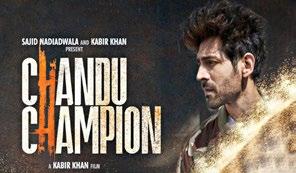
Another sports biographical drama film. While it’s great to hear about the challenges our athletes faced while emerging victorious in international arenas, we need a break specially straight after Maidaan and Mr and Mrs Mahi. We are excited though to see the magic that Kabir Khan and Kartik Aaryan will bring onscreen.
Releasing 14 June

KOTA FACTORY SEASON 3 (Netflix)
Jeetu Bhaiya is back with Season 3 of the popular web series Kota Factory. The web series shows the real-life challenges faced by IIT-JEE and NEET aspirants. Looks like it’s actor Jitendra Kumar’s lucky month as he is already winning hearts with his Panchayat 3.
Releasing 20 June
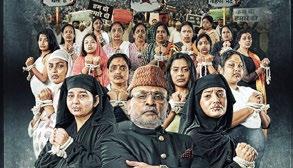
HAMARE BAARAH (In cinemas)
Set against the backdrop of Uttar Pradesh, this social drama addresses the issue of population rise in India while delving into the struggles faced by women. Veteran actor Annu Kapoor plays the main protagonist who relentlessly pursues fathering more children despite risks. Let’s hope this film tackles the social issue through its poignant narrative.
Releasing 7 June
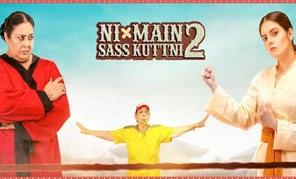
As the title suggests, this Punjabi film is a dark comedy focussing on the drama and issues between a mother-in-law and daughter-in-law. A sequel to the first film, it looks like the love-hate relationship between MIL and DIL is something many can relate to!
Releasing 7 June
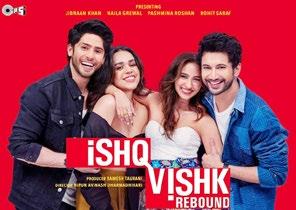
This fresh romantic film could be the rebound Gen Z can relate to! The successor to the iconic 2003 film Ishq Vishk, we now have the charming Rohit Saraf swooning the girls, and one of them is Hrithik Roshan’s cousin.
Releasing 21 June
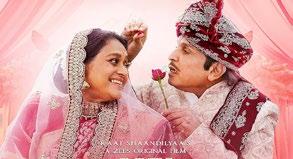
Get ready for a rollercoaster ride of fun, romance… and chaos! This romcom delivers a fresh spin on love stories and arranged marriages. Sunny Singh, Avneet Kaur, Annu Kapoor, Supriya Pathak, and Rajpal Yadav star.
Releasing 14 June
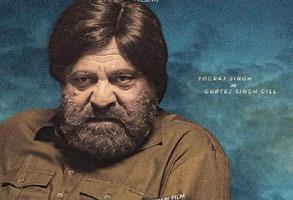
Inspired by the real events at Rode College, Moga, this Punjabi political drama film is about an undercover intelligence officer who gets admission as a student to the college to expose a mastermind, corrupt politician.
Releasing 7 June
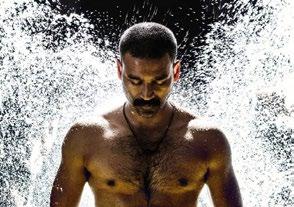
Dhanush directs and acts in this Tamil action thriller where he gets involved in the criminal underworld after trying to seek out those accountable for the murders in his family.
Releasing 13 June
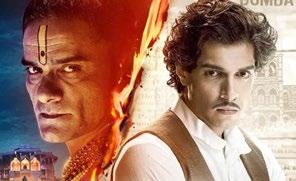
MAHARAJ (Netflix)
Aamir Khan’s son Junaid Khan makes his debut with Maharaj, where he plays the role of Karsandas Mulji, a journalist, social reformer and an advocate for women’s rights and social reform. Will his young shoulders be able to bear this weight, or will his coactor Jaideep Ahlawat be the force to reckon with here?
Releasing 14 June

Take a breath as this Tollywood film boasts a stellar cast – Prabhas, Amitabh
Kamal
and Deepika Padukone, all in one film! But why is there is no hungama about this mytho sci-fi drama yet? Latest reports reveal the filmmakers will soon release daily updates to create buzz and excitement leading up to the film’s release. We can’t wait!
Releasing 27 June
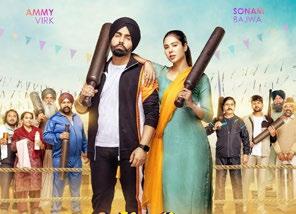
This romcom follows a carefree Punjabi jatt (Ammy Virk) who rediscovers his family’s wrestling legacy when he meets a lively, sparkling, passionate Haryanvi jaatni (Sonam Bajwa).
Releasing 14 June

UMRO AYYAR: A NEW BEGINNING (In cinemas)
Straight from its debut at the Cannes Film Festival, Pakistan’s first 3D film is finally here. This film is based on the classical Urdu-Persian novel Hamzanama’s character Umro Ayyar, a thief and legend warrior of Tilism-e-Hoshruba.
Releasing 12 June

Minal Khona has been reading tarot cards for the last two decades. She uses her intuition and connect with the cards mostly to help people.
You get the card representing Capricorn, so the impulsive April-born may be a bit more practical this month. You may have lots of expenses, you won’t run short. A trip could be on the agenda. If you are having issues with your throat, it may be because you are suppressing what needs to be said. A rocky relationship could end. Sound advice from friends regarding your career or finances should be taken. Act upon new ideas and keep an open mind.
Singles who’ve just recovered from a heartbreak won’t be keen on putting in too much effort this time round. And if a relationship is on rocky ground, give it time, it will heal. Expect a positive turnaround in your work and love life this month. Vent your emotions and let go of pentup stress by talking to someone or crying and letting go. Money delayed will come to you soon. This too shall pass, and any delays are in your favour.
The card for the zodiac sign of Cancer comes for Geminis, making them moodier than usual. Try and balance your mental and emotional sides for best results. There could come a situation in your life where you choose to walk away rather than stay. This could be a job or a relationship. Matters related to property could keep you busy. Slow down to avoid future ailments. A confrontation over money could take place but you will get what is owed to you.
The card for friendship denotes that those in a relationship might call it quits because one of you is not sure of what they want. Seniors at work will surprisingly offer help or a project that leads to extra income. Some of you may look for a job with a bigger organisation. A family reunion with letting go of grudges, is on hand. A long-standing money issue gets resolved. Resolve all your inner dilemmas if you want better relationships.
The card for success shows up for Leos, indicating that all the effort they put into their projects will bring good results. Some of you may choose to work in a field where you are more in the foreground than the background. A situation makes you feel trapped and irritable. Expect good news regarding a sale or a book offer. Take a muchneeded break if you have been exerting too much. A financial settlement is on the anvil.
Avoid having a mentality of lack and count your blessings. Singles should check if the person they are newly dating is not already married. Someone you know may need hospitalisation. A bout of depression could leave you feeling lonely and demotivated. Finances will improve gradually. A clear mindset will help you detach from those who are selfish. You will receive the guidance you need in stressful moments. Someone senior could make an offer to help you at work – take it up.
Time to rethink those self-destructive patterns you are repeating in your life that you need to release. Otherwise, the same lesson appears with different people. Business is good and finances are on the rise too. Avoid feelings of martyrdom and set boundaries in a relationship. Once you change your mindset, you will see positive changes all around you. Let go and let god, for a continuing problem. The destiny card indicates that whatever is happening right now, was meant to.
You could face a dilemma in your personal or professional life. Or, be offered two tempting options if looking for work. A setback turns out to be a blessing in disguise. It will help you to find a new line of work. A rocky marriage could make you feel trapped. Family members could be facing issues with property matters. Money comes in from unexpected sources. Go out and party because that is probably where you could get lucky with a new offer.
Divine protection is yours all month, across personal and financial matters. A misunderstanding with your spouse or boss could lead to a major change in your life. Time away from work will give you the break you need. You or a pet could need medical attention. Money will be the focus with expenses mounting but you will have multiple sources of income. Some of you may look for a new job. Your network of friends and family will help you attain your goals.
Fives indicate change in the realm of finances and the need for balance. Don’t focus so much on career and money that you lose touch with your spiritual side. Whatever you do, do it in moderation. You can change the outcome of a negative situation just by focussing your energy on more productive things. An old health issue could recur due to stress. Since it is a destiny card, events happening around you could lead to spiritual growth.
Singles will attract someone new into their lives effortlessly. Estranged friends or couples you know may reconcile. New orders or compensation for past work will lift you out of your monotony in your career. Avoid too much sun. Finances improve but sporadically. New ideas you have will get the required support. Waiting for things to change on their own is the best way out of any dilemmas you may be facing in your personal or professional life. Be practical at all times.
A major arcana, the card for Aquarius, comes for Pisces, making them more interested in humanitarian issues. Singles could meet someone interesting. If looking to sell a home, it will get sold. If things at work are stagnant, look for a new job. Medical tests could be the solution to a recurring health problem. Focus on your own life and be the star of your story to stay away from other people’s dramas. You will manifest what you desire, in time.
 DEAR AUNTYJI
DEAR AUNTYJI
I have been married for ten years to a wonderful man. He is kind, thoughtful and considerate, but a little on the reserved side. I love him dearly. He recently got a promotion and now, every so often, he goes to the pub
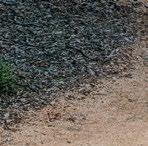
with his new manager and team. Auntyji, he has only a few drinks and comes straight home. But when he comes home, it’s like he’s a different man. He is jovial, he laughs at his own jokes, he makes me laugh and he even dances to Bollywood




music to try to make me laugh. He tells me funny stories, and also tells me how wonderful I am. Now, I know he is sincere when he says all this. But, I’m finding myself encouraging him to go out and drink with his buddies, because I know the man who returns a little tipsy will be so much fun. It’s like this other side of his personality is so wonderful, I want him to drink as often as he can. But Auntyji, I also worry. Am I enabling an alcoholic? Am I being selfish because I get to see the fun side of my beloved husband? The truth is, he goes out maybe once a fortnight, has no more than 3-4 beers, and he denies that he is drunk. But still, should I worry? Am I demonstrating an interest in only my own needs for a fun and happy husband - instead of his health? What should I do - I am worried I am becoming a sharaabi’s wife.



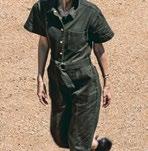




AUNTYJI SAYS
Are kalankini, you are the only wife I have heard of who loves it when her husband comes home tipsy. But look, I fully understand your perspective because there are clearly so many benefits there for you. Now, it looks like your husband allows the alcohol to wash away his inhibitions. And he only needs 3-4 beers for that to happen. He comes home a happier, more interesting version of himself. And he only does this once a fortnight. As I see it, there is no harm here. What’s 3-4 beers at a pub night? Heck, I’d even go so far as saying your husband is very measured in his drinking. Maybe the alcohol is helping bring out this other side of him. That famous line by Australian literary icon Henry Lawson comes to mind: “Beer makes you feel the way you ought to feel without beer.” Perhaps in the future, your darling patidev might not need the madira to be this fun, relaxed, entertaining version of himself. So my suggestion to you is to enjoy this, and get into the spirit of it. There are clearly so many benefits for you both - why would you deny yourself this. Now, if the 3 beers start turning into 3+2+5+1 other alcoholic drinks, then you may need to help hubby curtail this excess. So, do ghoont tumbhi pilo, and dekho phir hota hai kya.
Jhoom barabar jhoom, sharabi...
Do you have a question for Auntyji? Email it to info@indianlink.com.au
























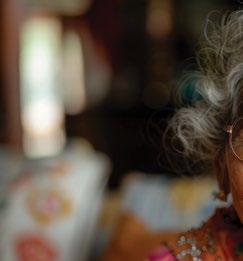


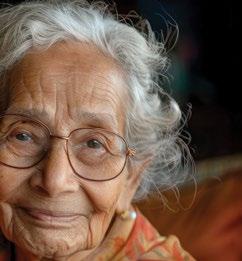

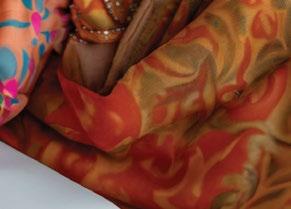
1. Australian Government Department of Health and Aged Care. Groups at higher risk
Copyright © 2024 Merck & Co., Inc., Rahway, NJ, USA, and its affiliates. All rights reserved. Merck Sharp & Dohme (Australia) Pty Limited. Level 1 – Building A, 26 Talavera Road, Macquarie Park NSW 2113. AU-ANV-00551. Issued May 2024. WITH WINTER COMING, DO YOU
If you’re 70+, plan for COVID-19 with your doctor.1 The risk of serious illness from COVID-19 increases with age, especially for people aged 70+.1 Even mild symptoms could get worse.2 For people 70 or older who test positive for COVID-19, oral antivirals are available.3 Talk to your doctor to know your risk.1 planforcovid.com.au

https://www.health.gov.au/topics/covid-19/about (accessed March 2024). 3. Australian Government Department of Health and Aged Care. Eligibility for oral COVID-19 treatments. https://www.health.gov.au/health-alerts/covid-19/treatments/ eligibility (accessed March 2024).





